Security Alert May 17, 2024
Worldwide caution, update may 10, 2024, information for u.s. citizens in the middle east.
- Travel Advisories |
- Contact Us |
- MyTravelGov |

Find U.S. Embassies & Consulates
Travel.state.gov, congressional liaison, special issuance agency, u.s. passports, international travel, intercountry adoption, international parental child abduction, records and authentications, popular links, travel advisories, mytravelgov, stay connected, legal resources, legal information, info for u.s. law enforcement, replace or certify documents.
Share this page:
Greece Travel Advisory
Travel advisory july 26, 2023, greece - level 1: exercise normal precautions.
Reissued with obsolete COVID-19 page links removed.
Exercise normal precautions in Greece.
Read the country information page for additional information on travel to Greece.
If you decide to travel to Greece:
- Enroll in the Smart Traveler Enrollment Program ( STEP ) to receive security messages and make it easier to locate you in an emergency.
- Follow the Department of State on Facebook and Twitter .
- Review the Country Security Report for Greece.
- Visit the CDC page for the latest Travel Health Information related to your travel.
- Prepare a contingency plan for emergency situations. Review the Traveler’s Checklist .
Travel Advisory Levels
Assistance for u.s. citizens, search for travel advisories, external link.
You are about to leave travel.state.gov for an external website that is not maintained by the U.S. Department of State.
Links to external websites are provided as a convenience and should not be construed as an endorsement by the U.S. Department of State of the views or products contained therein. If you wish to remain on travel.state.gov, click the "cancel" message.
You are about to visit:
Day Trips from Athens
48 Hours in Athens
Top Things to Do
Top Temple Sites
Best Beaches
Mount Olympus
Ancient Greek Theaters
Foods to Try
Top Restaurants in Athens
Best Bars in Athens
Best Time to Visit
Weather & Climate
Athens International Airport Guide
Cities to Visit
Neighborhoods to Explore
Traveling Safely in Greece
Despite periods of unrest, Greece remains relatively safe
:max_bytes(150000):strip_icc():format(webp)/50283_10150115088505451_4770943_n-56a3b1065f9b58b7d0d3321d.jpg)
Pedro Szekely/Flickr
Over the years, Greece has had occasional periods of unrest that have led travelers to wonder how safe the country is.
The bottom line: There are risks in traveling to Greece , including some unique to the country, but as of April 2020, the U.S. Department of State does not discourage American travelers from visiting the country and urges travelers to exercise normal precautions.
Concerns About Greece's Safety
Greece has been the site of many domestic terrorist attacks. In addition, the U.S. Department of State warns of the potential of transnational terrorist attacks in European countries. The warning indicates that all European countries are potentially vulnerable to terrorist attacks focused on public areas where tourists and locals may gather and provides detailed safety information to help tourists avoid becoming an opportunistic target.
The State Department also notes the following safety concerns about Greece:
- Strikes and demonstrations are common and they can escalate to violence. On Nov. 17 every year, you can expect to see demonstrations. This is the anniversary of the 1973 student uprising against the military regime.
- Beware of violent anarchist groups. Some use university campuses as a refuge. They may join in with peaceful demonstrations which then turn violent.
As in many European cities, there are warnings about crimes targeting tourists. The U.S. Department of State urges caution in Greek cities as crimes like pick-pocketing and purse snatching are known to take place in tourist areas, on public transportation (especially the Metro), and in Thessaloniki shopping areas. Car break-ins have been reported and the U.S. Embassy has received reports of alcohol-related attacks targeting individual tourists at some holiday resorts and bars.
Be careful, also, of the dangerous and often homemade celebratory fireworks for Greek Orthodox Easter celebrations at midnight on Holy Saturday.
Areas to Avoid in Greece
If there is rioting for any reason, these are the areas to avoid:
Downtown metropolitan areas: These areas are often the site of protests. In Athens, avoid the area around Syntagma Square, Panepistimou, and Embassy Row. Unfortunately, this also includes some of Athens' finest hotels.
University campuses: Violent anarchist groups have used campuses as a place of refuge and so the State Department warns that demonstrators frequently gather in the Polytechnic University region. The department also warns against going near Aristotle University.
While TV images can be scary in times of unrest, Greece has a long "tradition" of vigorous civil protest. Usually, no one gets hurt and the violence is directed at property, not people. If there are demonstrations and tear gas is used, that can affect the air quality of the immediate area. If the streets are filled with demonstrators, you can expect closures and transportation difficulties. Needless to say, sightseeing will be curtailed.
Spots For a Peaceful Trip in Greece
The large Greek cities are the most affected by demonstrations and strikes. Avoid the big cities and plan your trip to one of these more peaceful destinations:
- The Greek Islands : Santorini, Crete, Rhodes, Lesbos, and Corfu are all good options. On the larger islands, such as Crete and Corfu, there may be some disturbances in the major towns in times of stress, but nothing like what you would experience in Athens or Thessaloniki. If it concerns you, choose a hotel outside of the city centers of Heraklion, Chania, Thessaloniki, Rhodes City and Corfu Town, though the last two are rarely involved in civil disturbances.
- The Greek countryside: Places with older populations and spots that are a bit out of the way are likely to remain quiet. Nafplion, on the Peloponnese peninsula , is a pleasant town providing a good base for day trips to Corinth, Epidaurus and even across the Rio-Antirio Bridge to Delphi.
- A Greek Islands cruise: A Greek cruise is a great option, as the ships have the ability to skip a port stop if there are any problems developing. You get the full benefit of sea and sun, and you have mobility in your favor.
Tips for a Safer and Easier Trip
Consider these tips when traveling to Greece:
- Have a cell phone that works in Greece . Buy a pay-as-you-go phone there if necessary. An innkeeper trying to alert you to a situation may not want to make a pricey international call. Enter your hotel numbers and other important numbers in your cell phone, like sightseeing locations and restaurants, so you can call and ask if they are open, if they are accessible or if there is an alternate route. Keep your cell phone charged and have a backup power source.
- Travel light and smart. Dragging lots of luggage makes everything harder. Take half of what you think you'll need. Scale it down. Take the smaller camera. Tear out the chapter of the guidebook that you need or take a digital picture of it and avoid papers altogether. Forget the shoulder bag. Use a small backpack; you may want one with a strong metal grid inside.
- Buy a good map before you go. And keep it with you. If you do find your route blocked, you'll have options and if you call someone for assistance, you can understand their directions better. The Athens map provided by the GNTO office at the airport is excellent, and it's free. A paper map is still the best way to orient yourself without endlessly zooming in or out on a small screen and using up what may be precious battery power. Use your cell phone or another device alongside the paper map for detail.
- Take enough medication with you for twice the length of your trip. Pack one amount in your luggage and one in your carry-on. Keep at least a day or two's supply on you in a small pill container.
- Have a color copy of your passport with you and another copy in your luggage, along with extra copies of your itinerary. Email digital copies to an email account you can access via the internet.
- Enroll in the Smart Traveler Enrollment Program ( STEP ) to receive security messages and make it easier for the American Embassy to locate you in an emergency.
- Learn a few words of Greek and enough of the Greek alphabet to decipher street signs. It can warm your welcome and at the same time, help you stay on your route, which is crucial if you have to make last-minute changes.
- Talk to the Greeks. They likely know what is going on and will be happy to tell you, share their opinions, their politics and their advice. Keep tabs on things by reading English language newspapers, watching the local news station and asking questions at your hotel.
Travel Insurance and Trip Cancellation
If you become aware of unrest in Greek cities or develop concerns, you may decide to cancel your trip. Whether or not your travel insurance covers you if you cancel depends on your policy. Many travel insurers allow a cancellation if there is civil unrest in your destination or a region you must travel through. Contact your insurance company directly for details.
Note: If a protest or strike is predicted before you get on your plane, your travel insurance company may refuse to cover your expenses. Make sure you ask if the company excludes any planned incidents. And remember: Independence Day (March 25) and Nov. 17 often see protests in Greece.
2020 Travel Warnings for Countries in Africa
Greece Travel Advisories and Warnings
Is It Safe in Germany?
What Travelers Need to Know About Earthquakes in Greece
Is It Safe in Colombia?
Is It Safe in Europe?
How to Stay Safe on a Trip to the Dominican Republic
Is It Safe in Africa?
Is it Safe in France?
Avoid these Dangerous Places in Southeast Asia
The Weather in Greece: Climate, Seasons, and Average Temperature by Month
Is It Safe to Travel to Morocco?
Is it Safe in Kashmir?
Is Bangkok Safe?
Is It Safe in South America?
Hurricane Season in Mexico
- Skip to main content
- Skip to "About this site"
Language selection
Search travel.gc.ca.
Help us to improve our website. Take our survey !
COVID-19: travel health notice for all travellers
Greece travel advice
Latest updates: Editorial change
Last updated: June 4, 2024 08:03 ET
On this page
Safety and security, entry and exit requirements, laws and culture, natural disasters and climate, greece - take normal security precautions.
Take normal security precautions in Greece.
Back to top
Petty crime
Petty crime, such as pickpocketing, purse snatching and luggage theft occurs. Tourists are frequently targeted.
Organized groups of thieves often use distraction techniques and are particularly active:
- at tourist sites and attractions
- in restaurants, patios and bars
- in hotel lobbies
- on public transportation, including metro and trains to and from Athens International Airport
- at airports, bus and railway stations including Larissa and Peloponnese stations in Athens
While you’re in Greece:
- ensure that your belongings, including your passport, are secure at all times
- don’t keep your passport and other types of ID at the same place and carry a photocopy rather than the original
- avoid showing signs of affluence
- avoid carrying large sums of cash or unnecessary valuables
- pay attention to your surroundings, particularly in crowded and tourist areas
- be wary of unsolicited offers or advice from strangers
- avoid isolated areas, parks and down-market bars and restaurants, especially after dark
Violent crime
Violent crime, such as attacks committed by far-right extremists against individuals belonging to ethnic, religious or political minorities are uncommon, but do occur.
Always be vigilant and aware of your surroundings.
Spiked food and drinks
Never leave food or drinks unattended or in the care of strangers. Be wary of accepting snacks, beverages, gum or cigarettes from new acquaintances. These items may contain drugs that could put you at risk of sexual assault and robbery.
Victims of crime
If you are a victim of a crime, go to the nearest police station to report it. Keep a copy of your report, as you may need it to make a claim to your insurance provider.
If you are a victim of sexual assault:
- seek medical assistance, whether or not you appear to have been physically harmed
- contact the local police immediately and ensure they file a report
- inform consular officials at the nearest Canadian embassy or consulate
The Greek police has a dedicated unit to assist foreign tourists and offers services in English and other languages.
You can contact the tourism police 24/7 anywhere in Greece by dialling the 1571 or the regular police at 100.
Credit card and ATM fraud occurs.
When using debit or credit cards:
- pay careful attention when your cards are being handled by others
- use ATMs located in public areas or inside a bank or business
- avoid using card readers with an irregular or unusual feature
- cover the keypad with one hand when entering your PIN
- check for any unauthorized transactions on your account statements
Overseas fraud
There is a threat of terrorism in Europe. Terrorists have carried out attacks in several European cities. Terrorist attacks could occur at any time.
Targets could include:
- government buildings, including schools
- places of worship
- airports and other transportation hubs and networks
- public areas such as tourist attractions, restaurants, bars, coffee shops, shopping centres, markets, hotels and other sites frequented by foreigners
Be particularly vigilant if attending:
- sporting events
- religious holidays
- other public celebrations
Terrorists have used such occasions to mount attacks.
Extremist groups and organizations have used improvised explosive devices, bombs and arson attacks in urban areas to target:
- the Greek State and its institutions
- foreign commercial and diplomatic interests
- ethnic, religious and migrants’ centers and organizations
While tourists are not specifically targeted, you could find yourself in the wrong place at the wrong time.
Demonstrations and strikes
Demonstrations.
Demonstrations take place regularly, particularly in Athens and Thessaloniki. They are usually held on days of social or historical significance, such as:
- Workers' Day on May 1
- the commemoration of the Athens Polytechnic uprising of 1973 on November 17
- the commemoration of the riots of 2008 on December 6
In Athens, demonstrations and marches occur primarily in areas around:
- Syntagma Square, in front of the Greek Parliament
- Omonia Square
- the National Technical University complex on Patision Avenue
- Exarchia neighbourhood
In Thessaloniki, they occur primarily in areas around:
- Aristotelous Square
- Egnatia Street
- the Arch of Galerius
- the campus of the Aristotle University
Even peaceful demonstrations can turn violent at any time. Demonstrations and strikes can also lead to disruptions to traffic and public transportation.
- Avoid areas where demonstrations and large gatherings are taking place
- Follow the instructions of local authorities
- Monitor local media for information on ongoing demonstrations
Strikes and pressure tactics occur regularly, particularly in key sectors such as transport and public health services. These strikes can disrupt travel and public services.
- Consult local media to be aware of strikes that may affect your stay or travel plans
- In the event of a transport strike, plan extra time to get to your destination
Mass gatherings (large-scale events)
Women's safety
Foreigners have been sexually assaulted, most often on the islands.
Don’t accept rides from strangers or casual acquaintances.
Advice for women travellers
Water activities
Many beaches in Greece are supervised and enforce excellent safety procedures.
However, tidal changes and strong winds can cause hazardous currents and riptides.
Coral, urchin, jellyfish and other aquatic life found along reefs can poison, sting or cause infection if touched or stepped on.
- Always obey warning flags at beaches
- Ask local authorities about the presence of dangerous species and immediately seek medical assistance if you get hurt
- Wear reef shoes to protect yourself against stone and coral cuts or urchin stings
- Keep a safe distance from boats and restricted areas
- Avoid visiting beaches or coastal areas during periods of severe weather warnings
- Look out for signs warning of cliff erosion and falling rocks
- Don’t dive into unknown waters, as hidden rocks or shallow depths can cause serious injury or death
- Exercise caution and follow the advice of the local authorities
Recreational boating
If you are planning to go boating:
- know the capacity of your boat and don’t exceed it
- know and respect the navigation rules
- follow safe practices for all activities on the water
- keep a safe distance from areas reserved for certain activities such as snorkeling
- carry a VHF marine radio that will generate your position in case of emergency
- be prepared for emergencies
Water safety abroad
Outdoor activities, such as hiking, can be dangerous if unprepared. Trails are not always marked, and weather conditions can change rapidly, even in summer.
If you intend to go hiking or mountaineering:
- never do so alone, and do not part with your hiking companions
- obtain detailed information on your activity and on the environment in which you will be before setting out
- buy travel insurance that includes helicopter rescue and medical evacuation
- ensure that your physical condition is good enough to meet the challenges of your activity
- avoid venturing off marked trails
- ensure that you’re adequately equipped and bring sufficient water
- stay informed about weather and other conditions that may pose a hazard
- be aware of the presence of dangerous species such as snakes
- inform a family member or friend of your itinerary
- dial 112 from a cellphone for any emergency
Road safety
Road conditions and road safety can vary greatly throughout the country.
Severe traffic congestion and difficult terrain may lead to hazardous driving conditions.
Accidents causing fatalities are common. Drivers often drive at excessive speeds and are reckless.
Drivers and speeding motorbikes don’t always yield to pedestrians or bicycles. Exercise caution when walking, crossing streets or biking.
Accidents involving tourists renting motorbikes, scooters or mopeds are common, especially on the islands.
Small, unlicensed rental agencies do not always offer vehicles that comply with up-to-date safety standards.
- Read the rental contract carefully
- Inspect the equipment before renting it
- Never drink and drive
- Reduce your speed on rough and uneven terrain
- In the event of an accident, wait for police to arrive
You may not be able to file an insurance claim without a police report.
Public transportation
Public transportation is generally safe and reliable. The bus network is extensive, and train services connect certain major cities. Athens has a modern metro system. Strikes may sometimes affect transportation services.
Taxis are generally safe. Metered taxis are widely available.
There are fixed rates for transportation to and from Athens International Airport. Confirm the rate before departure.
Ferries between mainland Greece and its islands meet European safety standards.
Weather conditions and strong winds can lead to cancellations or significant delays. Rough sea conditions may cause motion sickness, particularly on high-speed ferries.
- Pay attention to pre-departure notices from your carrier
- Always reconfirm departure schedule before heading to the port
We do not make assessments on the compliance of foreign domestic airlines with international safety standards.
Information about foreign domestic airlines
Every country or territory decides who can enter or exit through its borders. The Government of Canada cannot intervene on your behalf if you do not meet your destination’s entry or exit requirements.
We have obtained the information on this page from the Greek authorities. It can, however, change at any time.
Verify this information with the Foreign Representatives in Canada .
- Schengen area
Greece is a Schengen area country. Canadian citizens do not need a visa for travel to countries within the Schengen area. However, visa-free travel only applies to stays of up to 90 days in any 180-day period. Stays are cumulative and include visits to any Schengen area country.
If you plan to stay in the Schengen area for a longer period of time, you will need a visa. You must contact the high commission or embassy of the country or countries you are travelling to and obtain the appropriate visa(s) prior to travel.
Useful links
- Foreign Representatives in Canada
Entry requirements vary depending on the type of passport you use for travel.
Before you travel, check with your transportation company about passport requirements. Its rules on passport validity may be more stringent than the country’s entry rules.
Regular Canadian passport
Your passport must be valid for at least 3 months beyond the date you expect to leave the Schengen area.
Passport for official travel
Different entry rules may apply.
Official travel
Passport with “X” gender identifier
While the Government of Canada issues passports with an “X” gender identifier, it cannot guarantee your entry or transit through other countries. You might face entry restrictions in countries that do not recognize the “X” gender identifier. Before you leave, check with the closest foreign representative for your destination.
Other travel documents
Different entry rules may apply when travelling with a temporary passport or an emergency travel document. Before you leave, check with the closest foreign representative for your destination.
- Foreign Representatives in Canada
- Canadian passports
Tourist visa: not required for stays up to 90 days in any 180-day period Business visa: not required for stays up to 90 days in any 180-day period Work visa: required Student visa: required
If you must stay in Greece longer than 90 days due to serious and unforeseen events, such as a medical emergency, you may be able to seek an extension of your stay as a visitor.
Present your request to the office of the Greek police on aliens’ issues at least 15 days before your 90-day, visa-free period expires.
Yellow fever
Learn about potential entry requirements related to yellow fever (vaccines section).
- Children and travel
Learn more about travelling with children .
Relevant Travel Health Notices
- Global Measles Notice - 13 March, 2024
- COVID-19 and International Travel - 13 March, 2024
This section contains information on possible health risks and restrictions regularly found or ongoing in the destination. Follow this advice to lower your risk of becoming ill while travelling. Not all risks are listed below.
Consult a health care professional or visit a travel health clinic preferably 6 weeks before you travel to get personalized health advice and recommendations.
Routine vaccines
Be sure that your routine vaccinations , as per your province or territory , are up-to-date before travelling, regardless of your destination.
Some of these vaccinations include measles-mumps-rubella (MMR), diphtheria, tetanus, pertussis, polio, varicella (chickenpox), influenza and others.
Pre-travel vaccines and medications
You may be at risk for preventable diseases while travelling in this destination. Talk to a travel health professional about which medications or vaccines may be right for you, based on your destination and itinerary.
Yellow fever is a disease caused by a flavivirus from the bite of an infected mosquito.
Travellers get vaccinated either because it is required to enter a country or because it is recommended for their protection.
- There is no risk of yellow fever in this country.
Country Entry Requirement*
- Proof of vaccination is not required to enter this country.
Recommendation
- Vaccination is not recommended.
* It is important to note that country entry requirements may not reflect your risk of yellow fever at your destination. It is recommended that you contact the nearest diplomatic or consular office of the destination(s) you will be visiting to verify any additional entry requirements.
About Yellow Fever
Yellow Fever Vaccination Centres in Canada
Malaria is a serious and sometimes fatal disease that is caused by parasites spread through the bites of mosquitoes. Limited malaria transmission may occur in this destination, but risk to travellers is very low. Antimalarial medication is not recommended for most travellers. Consult a health care professional or visit a travel health clinic before travelling to discuss your options. It is recommended to do this 6 weeks before travel, however, it is still a good idea any time before leaving. Protect yourself from mosquito bites at all times:
- Cover your skin and use an approved insect repellent on uncovered skin.
- Exclude mosquitoes from your living area with screening and/or closed, well-sealed doors and windows.
- Use insecticide-treated bed nets if mosquitoes cannot be excluded from your living area.
- Wear permethrin-treated clothing.
If you develop symptoms similar to malaria when you are travelling or up to a year after you return home, see a health care professional immediately. Tell them where you have been travelling or living.
In this destination, rabies may be present in some wildlife species, including bats. Rabies is a deadly disease that spreads to humans primarily through bites or scratches from an infected animal.
If you are bitten or scratched by an animal while travelling, immediately wash the wound with soap and clean water and see a health care professional.
Before travel, discuss rabies vaccination with a health care professional. It may be recommended for travellers who will be working directly with wildlife.
Measles is a highly contagious viral disease. It can spread quickly from person to person by direct contact and through droplets in the air.
Anyone who is not protected against measles is at risk of being infected with it when travelling internationally.
Regardless of where you are going, talk to a health care professional before travelling to make sure you are fully protected against measles.
Hepatitis B is a risk in every destination. It is a viral liver disease that is easily transmitted from one person to another through exposure to blood and body fluids containing the hepatitis B virus. Travellers who may be exposed to blood or other bodily fluids (e.g., through sexual contact, medical treatment, sharing needles, tattooing, acupuncture or occupational exposure) are at higher risk of getting hepatitis B.
Hepatitis B vaccination is recommended for all travellers. Prevent hepatitis B infection by practicing safe sex, only using new and sterile drug equipment, and only getting tattoos and piercings in settings that follow public health regulations and standards.
Coronavirus disease (COVID-19) is an infectious viral disease. It can spread from person to person by direct contact and through droplets in the air.
It is recommended that all eligible travellers complete a COVID-19 vaccine series along with any additional recommended doses in Canada before travelling. Evidence shows that vaccines are very effective at preventing severe illness, hospitalization and death from COVID-19. While vaccination provides better protection against serious illness, you may still be at risk of infection from the virus that causes COVID-19. Anyone who has not completed a vaccine series is at increased risk of being infected with the virus that causes COVID-19 and is at greater risk for severe disease when travelling internationally.
Before travelling, verify your destination’s COVID-19 vaccination entry/exit requirements. Regardless of where you are going, talk to a health care professional before travelling to make sure you are adequately protected against COVID-19.
The best way to protect yourself from seasonal influenza (flu) is to get vaccinated every year. Get the flu shot at least 2 weeks before travelling.
The flu occurs worldwide.
- In the Northern Hemisphere, the flu season usually runs from November to April.
- In the Southern Hemisphere, the flu season usually runs between April and October.
- In the tropics, there is flu activity year round.
The flu vaccine available in one hemisphere may only offer partial protection against the flu in the other hemisphere.
The flu virus spreads from person to person when they cough or sneeze or by touching objects and surfaces that have been contaminated with the virus. Clean your hands often and wear a mask if you have a fever or respiratory symptoms.
Safe food and water precautions
Many illnesses can be caused by eating food or drinking beverages contaminated by bacteria, parasites, toxins, or viruses, or by swimming or bathing in contaminated water.
- Learn more about food and water precautions to take to avoid getting sick by visiting our eat and drink safely abroad page. Remember: Boil it, cook it, peel it, or leave it!
- Avoid getting water into your eyes, mouth or nose when swimming or participating in activities in freshwater (streams, canals, lakes), particularly after flooding or heavy rain. Water may look clean but could still be polluted or contaminated.
- Avoid inhaling or swallowing water while bathing, showering, or swimming in pools or hot tubs.
Insect bite prevention
Many diseases are spread by the bites of infected insects such as mosquitoes, ticks, fleas or flies. When travelling to areas where infected insects may be present:
- Use insect repellent (bug spray) on exposed skin
- Cover up with light-coloured, loose clothes made of tightly woven materials such as nylon or polyester
- Minimize exposure to insects
- Use mosquito netting when sleeping outdoors or in buildings that are not fully enclosed
To learn more about how you can reduce your risk of infection and disease caused by bites, both at home and abroad, visit our insect bite prevention page.
Find out what types of insects are present where you’re travelling, when they’re most active, and the symptoms of the diseases they spread.
Animal precautions
Some infections, such as rabies and influenza, can be shared between humans and animals. Certain types of activities may increase your chance of contact with animals, such as travelling in rural or forested areas, camping, hiking, and visiting wet markets (places where live animals are slaughtered and sold) or caves.
Travellers are cautioned to avoid contact with animals, including dogs, livestock (pigs, cows), monkeys, snakes, rodents, birds, and bats, and to avoid eating undercooked wild game.
Closely supervise children, as they are more likely to come in contact with animals.
Person-to-person infections
Stay home if you’re sick and practise proper cough and sneeze etiquette , which includes coughing or sneezing into a tissue or the bend of your arm, not your hand. Reduce your risk of colds, the flu and other illnesses by:
- washing your hands often
- avoiding or limiting the amount of time spent in closed spaces, crowded places, or at large-scale events (concerts, sporting events, rallies)
- avoiding close physical contact with people who may be showing symptoms of illness
Sexually transmitted infections (STIs) , HIV , and mpox are spread through blood and bodily fluids; use condoms, practise safe sex, and limit your number of sexual partners. Check with your local public health authority pre-travel to determine your eligibility for mpox vaccine.
Medical services and facilities
Health care is adequate, but varies throughout the country.
Facilities are generally good in cities such as Athens and Thessaloniki and in towns that have large hospitals, such as Heraklion, Ioannina and Patras.
If you’re travelling to smaller islands or to remote areas, you may need a medical evacuation to a central hospital, in the event of serious illness or injury.
Make sure you get travel insurance that includes coverage for medical evacuation and hospital stays.
Travel health and safety
Keep in Mind...
The decision to travel is the sole responsibility of the traveller. The traveller is also responsible for his or her own personal safety.
Be prepared. Do not expect medical services to be the same as in Canada. Pack a travel health kit , especially if you will be travelling away from major city centres.
You must abide by local laws.
Learn about what you should do and how we can help if you are arrested or detained abroad .
Transfer to a Canadian prison
Canada and Greece are signatories to the Convention on the Transfer of Sentenced Persons. This enables a Canadian imprisoned in Greece to request a transfer to a Canadian prison to complete a sentence. The transfer requires the agreement of both Canadian and Greece authorities.
This process can take a long time, and there is no guarantee that the transfer will be approved by either or both sides.
Penalties for possession, use or trafficking of illegal drugs are severe. Convicted offenders can expect prison sentences and heavy fines.
Drugs, alcohol and travel
Identification
Local police may ask to see your identification at any time.
- Carry adequate identification at all times, such as your passport or residence permit
- Keep a photocopy of your passport in a safe place, in case it is lost or stolen
Photography
There are restrictions on photographing and filming:
- military installations and military personnel
- border areas
- harbours, airports and other transportation hubs
- churches, monasteries and monks
In and around these areas, you should always:
- verify if photography is allowed or if a special permit is required
- request permission if individuals are involved
- refrain from photographing or filming if in doubt
- comply with all requests from local authorities
Recreational and commercial flying of drones is regulated.
You must register your drone to use it across the European Union. If you don’t comply, you may be fined and your drone confiscated.
- Information to visitors concerning drones - Hellenic Civil Aviation Authority (HCAA)
- Civil drones - European Union Aviation Safety Agency
Greece has strict laws regarding the possession and use of weapons and items that may be used as weapons, such as:
- knuckledusters
- pocketknife
- pepper spray
Do not buy or travel with these items.
Cultural heritage and antiquities
There are strict laws regarding:
- purchase and exportation of antiquities and objects of special significance to the country's cultural heritage
- excavation and on-site archaeological research
- access to underwater archaeological sites
- filming and photography of archaeological sites for commercial purposes
- protection of archaeological sites and monuments
To avoid any difficulties, make sure you:
- have the proper permit to conduct activities related to cultural heritage and archaeological sites
- obtain and carry the required legal paperwork to purchase or export antiquities
While visiting archaeological sites and monuments:
- don’t film or photograph unless it is clearly allowed
- stay on the dedicated paths and respect off-limits areas
- don’t touch statues and monuments
- don’t pick up rocks or any other artifacts found on site
Greek Cultural Heritage law - Hellenic Society for Law and Archaeology
Dual citizenship
Dual citizenship is legally recognized in Greece.
If you are a Canadian citizen, but also a citizen of Greece, our ability to offer you consular services may be limited while you're there. You may also be subject to different entry/exit requirements .
Travellers with dual citizenship
National obligations
If you are a Canadian citizen, but also a citizen of Greece, or are eligible for Greek citizenship, you may be subject to compulsory military service and other aspects of Greek law.
Obtain a document certifying your status from the Embassy of Greece prior to travel.
- National service - Embassy of Greece in Ottawa
- Greek citizenship - Embassy of Greece in Ottawa
International Child Abduction
The Hague Convention on the Civil Aspects of International Child Abduction is an international treaty. It can help parents with the return of children who have been removed to or retained in certain countries in violation of custody rights. The convention applies between Canada and Greece.
If your child was wrongfully taken to, or is being held in Greece, and if the applicable conditions are met, you may apply for the return of your child to the Greek court.
If you are in this situation:
- act as quickly as you can
- contact the Central Authority for your province or territory of residence for information on starting an application under The Hague Convention
- consult a lawyer in Canada and in Greece to explore all the legal options for the return of your child
- report the situation to the nearest Canadian government office abroad or to the Vulnerable Children's Consular Unit at Global Affairs Canada by calling the Emergency Watch and Response Centre
If your child was removed from a country other than Canada, consult a lawyer to determine if The Hague Convention applies.
Be aware that Canadian consular officials cannot interfere in private legal matters or in another country's judicial affairs.
- List of Canadian Central Authorities for the Hague Convention
- International Child Abductions: A guide for affected parents
- The Hague Convention – Hague Conference on Private International Law
- Canadian embassies and consulates by destination
- Request emergency assistance
If you plan on entering Greece by sea on your boat or a rented boat of a total length of over 7 metres, you must pay the Recreational and Daily Tour Cruise Ships fee (TEPAI). This must be done online prior to arrival.
Recreational and Daily Tour Cruise Ships fee - Independent Authority for Public Revenue (AADE) (in Greek)
As a tourist or temporary resident, you can drive with a valid Canadian driver’s licence.
You must have valid insurance coverage.
You must wear a helmet when driving or as a passenger of a motorcycle, a scooter or a moped. You may be fined if you fail to comply.
Carrying an individual in an irregular migration situation in your vehicle, even without your knowledge, is a criminal offence. Don’t pick up hitchhikers.
Driving in Greece - European Commission
The currency of Greece is the euro (EUR).
ATMs may not be easily available in remote areas or may be out of cash. Make sure to carry some money if you plan on visiting small islands and remote regions.
If you are carrying €10,000 or more, or the equivalent in other currencies, you must make a declaration to customs when you enter or leave the European Union. It includes sums in:
- banknotes and coins
- bearer negotiable instruments such as cheques, travellers’ cheques, promissory notes and money orders
- bonds, shares
- gold coins with a gold content of at least 90 %
- gold bars, nuggets or clumps with a gold content of at least 99.5 %
- any other convertible asset
This does not apply if you are travelling within the European Union or in transit to a non-EU country.
EU cash controls - European Commission
Seismic activity
Greece is located in an active seismic zone. Major earthquakes could occur and can cause significant damage.
Santorini and Nisyros islands have active volcanoes.
If you’re travelling near an active volcano or are practising volcano tourism:
- closely monitor volcanic activity levels through local media and official sources
- ensure that you’re well informed about conditions that may pose a hazard
- follow the advice of local authorities
- Earthquakes - What to Do?
- Latest earthquakes - National Observatory of Athens
- Volcanic eruptions - Ministry for climate crisis and civil protections
Seasonal storms and flooding
Seasonal storms and heavy rains can cause severe flooding and landslides particularly during the spring and winter months. Roads may become impassable and infrastructure damaged.
- Stay informed of the latest regional weather forecasts
- Follow the advice of local authorities, including evacuation orders
Weather forecast and alerts - Hellenic National Meteorological Service
Meltemi wind
The Meltemi or Etesian is a strong wind that regularly sweeps the Aegean and the eastern Mediterranean seas from May to September. It can blow uninterruptedly for several days. This wind may bring high waves, strong currents and may disrupt transportation.
If you travel to Greece during this period:
- expect possible transportation delays or cancellations
- be very cautious if sailing or boating
- avoid swimming during rough sea conditions
- monitor the latest regional weather forecasts
Wildfires are common between July and September, particularly in:
- the Peloponnese
- Central Greece
- Eastern Macedonia and Thrace
- the northern areas of Athens.
The air quality in areas near active fires may deteriorate due to heavy smoke.
In case of a major fire:
- stay away from affected areas, particularly if you suffer from respiratory ailments
- follow the advice of local emergency services personnel, including evacuation orders
- monitor local media for up-to-date information on the situation
Latest information on fires - General Secretariat for Civil Protection
Local services
- 112 for emergency assistance
- 1571 for tourist police
- 100 for police
Consular assistance
For emergency consular assistance, call the Embassy of Canada to Greece, in Athens, and follow the instructions. At any time, you may also contact the Emergency Watch and Response Centre in Ottawa.
The decision to travel is your choice and you are responsible for your personal safety abroad. We take the safety and security of Canadians abroad very seriously and provide credible and timely information in our Travel Advice to enable you to make well-informed decisions regarding your travel abroad.
The content on this page is provided for information only. While we make every effort to give you correct information, it is provided on an "as is" basis without warranty of any kind, expressed or implied. The Government of Canada does not assume responsibility and will not be liable for any damages in connection to the information provided.
If you need consular assistance while abroad, we will make every effort to help you. However, there may be constraints that will limit the ability of the Government of Canada to provide services.
Learn more about consular services .
Risk Levels
take normal security precautions.
Take similar precautions to those you would take in Canada.
Exercise a high degree of caution
There are certain safety and security concerns or the situation could change quickly. Be very cautious at all times, monitor local media and follow the instructions of local authorities.
IMPORTANT: The two levels below are official Government of Canada Travel Advisories and are issued when the safety and security of Canadians travelling or living in the country or region may be at risk.
Avoid non-essential travel
Your safety and security could be at risk. You should think about your need to travel to this country, territory or region based on family or business requirements, knowledge of or familiarity with the region, and other factors. If you are already there, think about whether you really need to be there. If you do not need to be there, you should think about leaving.
Avoid all travel
You should not travel to this country, territory or region. Your personal safety and security are at great risk. If you are already there, you should think about leaving if it is safe to do so.
What travel looks like in Greece in 2020
Aug 12, 2020 • 5 min read

© Sylvain Sonnet/Getty Images
Thanks to some early intervention, Greece was remarkably successful at containing the coronavirus. The country confirmed its first positive case of COVID-19 on February 6, closed schools, theaters, and gyms in early March and entered full lockdown less than two weeks later. By May, things were opening back up – tourists were welcomed back June 15 and international flights recommenced July 1. However, on August 10, Greece confirmed it was in a second wave due to recent spike in infections and introduced new restrictive measures aimed at stabilising the situation.
Editor's note: This story was last updated on August 12, 2020. We will update this piece regularly to stay on top of the latest travel advice.
Travel restrictions in Greece
Only residents of EU and Schengen member states, plus the UK, are allowed entry for non-essential purposes, though exemptions apply for travelers from Australia, Canada, Georgia, Japan, New Zealand, Rwanda, South Korea, Thailand, Tunisia, and Uruguay. Twenty-four hours prior to entry, all visitors must submit a Passenger Locator Form (PLF) detailing their contact information while in country, and on the day of their scheduled arrival, they’ll receive an email with a link to a QR code that must be presented upon screening. Anyone making multiple stops in Greece must declare and report their itinerary for the next 7 days.
As of August 17, travelers arriving from Sweden, Belgium, the Netherlands, Spain and the Czech Republic must present a negative COVID-19 test result taken within 72 hours of travel. The same requirements apply to passengers arriving from Bulgaria, Malta and Romania.
Ferry arrivals are only allowed at ports in Patras, Corfu and Igoumenitsa, and passengers must present a PLF QR code; passengers arriving via yacht have no such restrictions. By land, travelers crossing the Promachonas border with Bulgaria are required to show negative test results. Passengers in transit to a final destination will be permitted to pass through. A maximum of 750 people will be allowed to cross through the Kakavia land border with Albania as of August 16.
Will I have to quarantine when I arrive in Greece?
Any traveler who tests positive on arrival will be contacted and placed on a 14-day quarantine.
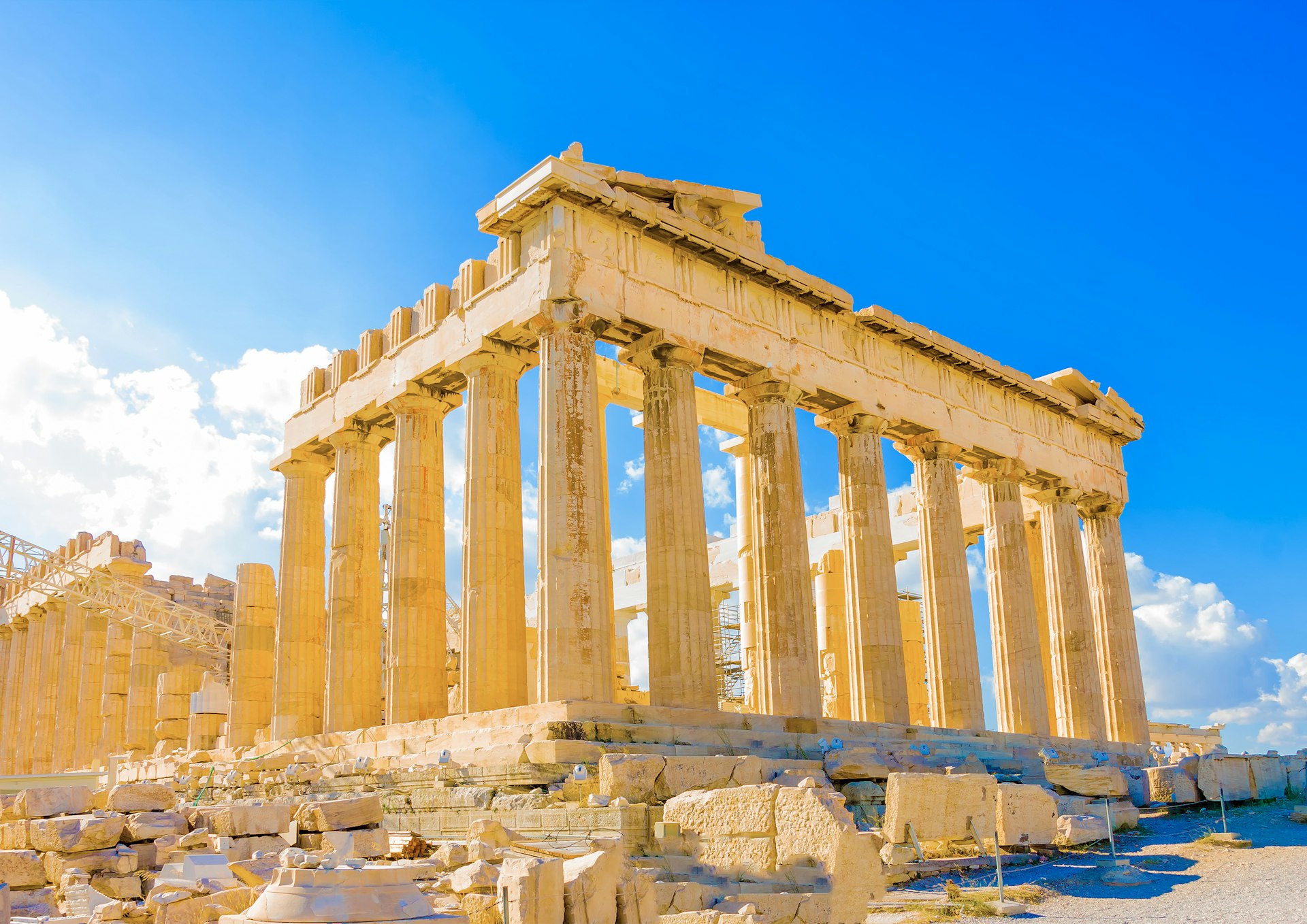
Current lockdown status in Greece
Ahead of the return of international tourism on July 1, Greece reopened restaurants, bars, and cafes, with tables spaced one meter apart for outdoor dining and 2 meters apart for indoor. Waitstaff is required to wear a mask, and customers are encouraged to do so as well.
With the recent spike in cases — which officials are blaming on overcrowding in clubs and social events despite new regulations — all bars, restaurants and food-related shops will have to close by midnight in the regions of Crete, East Macedonia, Thrace, and in some regional areas of Thessaloniki, Halkidiki, Larissa and Corfu. Similar rules apply in the municipalities of Mykonos, Paros, Santorini, Volos, Katerini, Rhodes, Antiparos, Zakynthos and Kos. The new curfew will remain in place until August 23.
Hotels and other accommodations, operating under strict health protocols , are accepting guests. Ferry service to the islands has resumed, and social distancing and masks are required in public spaces and on public transit and beaches. Beach umbrellas must be spaced four meters apart.
Many of the country’s famed archaeological sites reopened in May, and museums followed suit in June, both placing limits on the number of visitors allowed at a time.
You might be wondering about...
Athens: In late May, the Acropolis reopened, along with 200 outdoor archaeological sites across the country. The Acropolis Museum is open as well, with masks required and social-distancing expected.
Greek Islands: Greece reopened its 18 regional airports to international arrivals July 1, and travelers arriving on Rhodes, Crete, and elsewhere were welcomed with local sweets and live musical performances . Ferries are reportedly running at 60% capacity, and passengers are required to fill out a health questionnaire and have their temperature taken before boarding. Bars and restaurants on some of the most popular holiday islands are required to close at midnight.
According to USA Today , to prepare for the influx of travelers, “a safety net [has] been built for the islands – with connections to each other and to mainland hospitals for testing and health evacuations. The network of doctors and support staff will be deployed with the help of more than 100 mobile units in cars and speed boats, and backed by the coast guard, air force, and civil authorities. The health ministry will also have 11 futuristic-looking ‘transit capsules’ that can be used for patients heading to intensive care facilities.”
What they’re saying in Greece about COVID-19 and travel
When Greece announced its reopening, officials knew they were taking a chance – but when tourism is responsible for a fifth of the national economy, it seems a chance worth taking. “It’s a calculated risk,” tourism minister Harry Theocharis told Reuters in July. “We do not rush things, we take it one step at a time.”
In June, the Associated Press reported that 99% of the country’s travel revenue dropped during April lockdown, and while some locals might have enjoyed less density on previously crowded beaches and streets, many also missed the seasonal traffic they rely upon to make a living. “Nice as it is, we can't pay our bills with sand," Mykonos resident Stacey Harris-Papaioannou told the BBC.
They could be waiting awhile for that financial rebound. According to one recent study , most people trust that Greece has handled the pandemic appropriately, but only a quarter of the 3,000 people surveyed said they intended to visit before September.
Especially now that officials will be scrambling to break the chain of transmission as infection numbers swell again. Gkikas Magiorkinis, assistant professor of hygiene and epidemiology at Athens university, told the Guardian on August 10 that “Greece has formally entered a second wave of the epidemic. This is the point that we could win or lose the battle”.
COVID-19 snapshot
You might also like:
- Greece is introducing stricter measures after an increase in COVID-19 cases
- Cafes and bars reopen as Greece prepares to welcome tourists
- Greece uses drones to monitor social distancing at beaches
This article was first published Jul 28, 2020 and updated Aug 12, 2020.
Explore related stories

May 31, 2024 • 4 min read
Local writers share their favorite lesser-visited destinations for their vacations in Greece.

May 13, 2024 • 13 min read

Mar 22, 2024 • 7 min read

Mar 15, 2024 • 10 min read
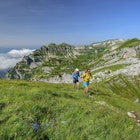
Mar 14, 2024 • 16 min read

Mar 6, 2024 • 8 min read
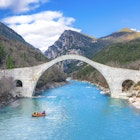
Mar 4, 2024 • 6 min read
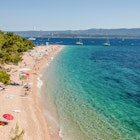
Feb 26, 2024 • 8 min read

Feb 19, 2024 • 7 min read
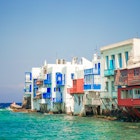
Feb 15, 2024 • 4 min read
You are using an outdated browser. Upgrade your browser today or install Google Chrome Frame to better experience this site.
Greece Traveler View
Travel health notices, vaccines and medicines, non-vaccine-preventable diseases, stay healthy and safe.
- Packing List
After Your Trip
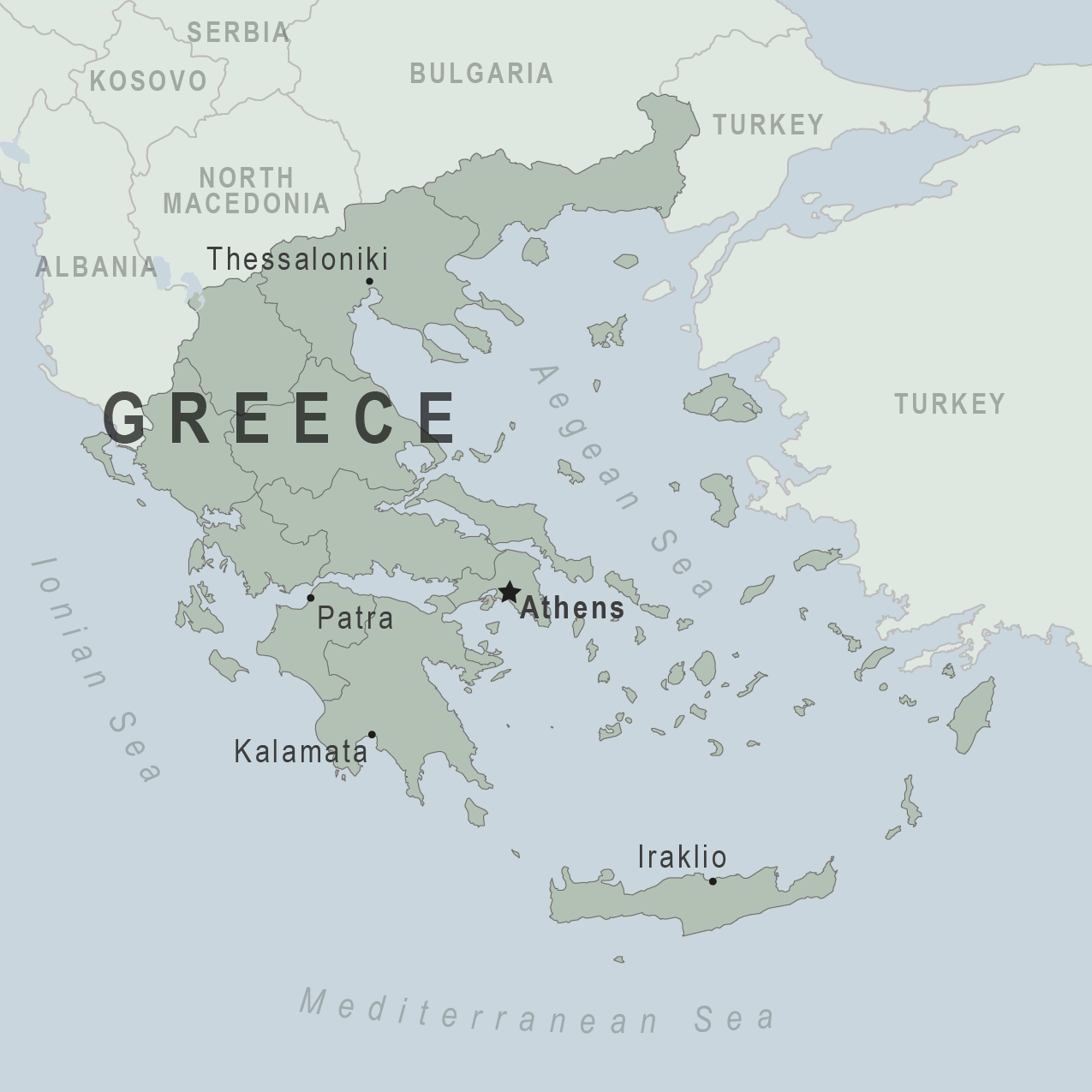
There are no notices currently in effect for Greece.
⇧ Top
Check the vaccines and medicines list and visit your doctor at least a month before your trip to get vaccines or medicines you may need. If you or your doctor need help finding a location that provides certain vaccines or medicines, visit the Find a Clinic page.
Routine vaccines
Recommendations.
Make sure you are up-to-date on all routine vaccines before every trip. Some of these vaccines include
- Chickenpox (Varicella)
- Diphtheria-Tetanus-Pertussis
- Flu (influenza)
- Measles-Mumps-Rubella (MMR)
Immunization schedules
All eligible travelers should be up to date with their COVID-19 vaccines. Please see Your COVID-19 Vaccination for more information.
COVID-19 vaccine
Hepatitis A
Consider hepatitis A vaccination for most travelers. It is recommended for travelers who will be doing higher risk activities, such as visiting smaller cities, villages, or rural areas where a traveler might get infected through food or water. It is recommended for travelers who plan on eating street food.
Hepatitis A - CDC Yellow Book
Dosing info - Hep A
Hepatitis B
Recommended for unvaccinated travelers younger than 60 years old traveling to Greece. Unvaccinated travelers 60 years and older may get vaccinated before traveling to Greece.
Hepatitis B - CDC Yellow Book
Dosing info - Hep B
Cases of measles are on the rise worldwide. Travelers are at risk of measles if they have not been fully vaccinated at least two weeks prior to departure, or have not had measles in the past, and travel internationally to areas where measles is spreading.
All international travelers should be fully vaccinated against measles with the measles-mumps-rubella (MMR) vaccine, including an early dose for infants 6–11 months, according to CDC’s measles vaccination recommendations for international travel .
Measles (Rubeola) - CDC Yellow Book
Dogs infected with rabies are not commonly found in Greece.
If rabies exposures occur while in Greece, rabies vaccines are typically available throughout most of the country.
Rabies pre-exposure vaccination considerations include whether travelers 1) will be performing occupational or recreational activities that increase risk for exposure to potentially rabid animals and 2) might have difficulty getting prompt access to safe post-exposure prophylaxis.
Please consult with a healthcare provider to determine whether you should receive pre-exposure vaccination before travel.
For more information, see country rabies status assessments .
Rabies - CDC Yellow Book
Avoid contaminated water
Leptospirosis
How most people get sick (most common modes of transmission)
- Touching urine or other body fluids from an animal infected with leptospirosis
- Swimming or wading in urine-contaminated fresh water, or contact with urine-contaminated mud
- Drinking water or eating food contaminated with animal urine
- Avoid contaminated water and soil
Clinical Guidance
Avoid bug bites.
Crimean-Congo Hemorrhagic fever
- Tick bite
- Touching the body fluids of a person or animal infected with CCHF
- Avoid Bug Bites
Leishmaniasis
- Sand fly bite
Tick-borne Encephalitis
Tickborne Encephalitis
Airborne & droplet
- Breathing in air or accidentally eating food contaminated with the urine, droppings, or saliva of infected rodents
- Bite from an infected rodent
- Less commonly, being around someone sick with hantavirus (only occurs with Andes virus)
- Avoid rodents and areas where they live
- Avoid sick people
Tuberculosis (TB)
- Breathe in TB bacteria that is in the air from an infected and contagious person coughing, speaking, or singing.
Learn actions you can take to stay healthy and safe on your trip. Vaccines cannot protect you from many diseases in Greece, so your behaviors are important.
Eat and drink safely
Food and water standards around the world vary based on the destination. Standards may also differ within a country and risk may change depending on activity type (e.g., hiking versus business trip). You can learn more about safe food and drink choices when traveling by accessing the resources below.
- Choose Safe Food and Drinks When Traveling
- Water Treatment Options When Hiking, Camping or Traveling
- Global Water, Sanitation and Hygiene | Healthy Water
- Avoid Contaminated Water During Travel
You can also visit the Department of State Country Information Pages for additional information about food and water safety.
Prevent bug bites
Although Greece is an industrialized country, bug bites here can still spread diseases. Just as you would in the United States, try to avoid bug bites while spending time outside or in wooded areas.
What can I do to prevent bug bites?
- Cover exposed skin by wearing long-sleeved shirts, long pants, and hats.
- Use an appropriate insect repellent (see below).
- Consider using permethrin-treated clothing and gear if spending a lot of time outside. Do not use permethrin directly on skin.
What type of insect repellent should I use?
- FOR PROTECTION AGAINST TICKS AND MOSQUITOES: Use a repellent that contains 20% or more DEET for protection that lasts up to several hours.
- Picaridin (also known as KBR 3023, Bayrepel, and icaridin)
- Oil of lemon eucalyptus (OLE) or para-menthane-diol (PMD)
- 2-undecanone
- Always use insect repellent as directed.
What should I do if I am bitten by bugs?
- Avoid scratching bug bites, and apply hydrocortisone cream or calamine lotion to reduce the itching.
- Check your entire body for ticks after outdoor activity. Be sure to remove ticks properly.
What can I do to avoid bed bugs?
Although bed bugs do not carry disease, they are an annoyance. See our information page about avoiding bug bites for some easy tips to avoid them. For more information on bed bugs, see Bed Bugs .
For more detailed information on avoiding bug bites, see Avoid Bug Bites .
Stay safe outdoors
If your travel plans in Greece include outdoor activities, take these steps to stay safe and healthy during your trip:
- Stay alert to changing weather conditions and adjust your plans if conditions become unsafe.
- Prepare for activities by wearing the right clothes and packing protective items, such as bug spray, sunscreen, and a basic first aid kit.
- Consider learning basic first aid and CPR before travel. Bring a travel health kit with items appropriate for your activities.
- If you are outside for many hours in the heat, eat salty snacks and drink water to stay hydrated and replace salt lost through sweating.
- Protect yourself from UV radiation : use sunscreen with an SPF of at least 15, wear protective clothing, and seek shade during the hottest time of day (10 a.m.–4 p.m.).
- Be especially careful during summer months and at high elevation. Because sunlight reflects off snow, sand, and water, sun exposure may be increased during activities like skiing, swimming, and sailing.
- Very cold temperatures can be dangerous. Dress in layers and cover heads, hands, and feet properly if you are visiting a cold location.
Stay safe around water
- Swim only in designated swimming areas. Obey lifeguards and warning flags on beaches.
- Do not dive into shallow water.
- Avoid swallowing water when swimming. Untreated water can carry germs that make you sick.
- Practice safe boating—follow all boating safety laws, do not drink alcohol if you are driving a boat, and always wear a life jacket.
Keep away from animals
Most animals avoid people, but they may attack if they feel threatened, are protecting their young or territory, or if they are injured or ill. Animal bites and scratches can lead to serious diseases such as rabies.
Follow these tips to protect yourself:
- Do not touch or feed any animals you do not know.
- Do not allow animals to lick open wounds, and do not get animal saliva in your eyes or mouth.
- Avoid rodents and their urine and feces.
- Traveling pets should be supervised closely and not allowed to come in contact with local animals.
- If you wake in a room with a bat, seek medical care immediately. Bat bites may be hard to see.
All animals can pose a threat, but be extra careful around dogs, bats, monkeys, sea animals such as jellyfish, and snakes. If you are bitten or scratched by an animal, immediately:
- Wash the wound with soap and clean water.
- Go to a doctor right away.
- Tell your doctor about your injury when you get back to the United States.
Reduce your exposure to germs
Follow these tips to avoid getting sick or spreading illness to others while traveling:
- Wash your hands often, especially before eating.
- If soap and water aren’t available, clean hands with hand sanitizer (containing at least 60% alcohol).
- Don’t touch your eyes, nose, or mouth. If you need to touch your face, make sure your hands are clean.
- Cover your mouth and nose with a tissue or your sleeve (not your hands) when coughing or sneezing.
- Try to avoid contact with people who are sick.
- If you are sick, stay home or in your hotel room, unless you need medical care.
Avoid sharing body fluids
Diseases can be spread through body fluids, such as saliva, blood, vomit, and semen.
Protect yourself:
- Use latex condoms correctly.
- Do not inject drugs.
- Limit alcohol consumption. People take more risks when intoxicated.
- Do not share needles or any devices that can break the skin. That includes needles for tattoos, piercings, and acupuncture.
- If you receive medical or dental care, make sure the equipment is disinfected or sanitized.
Know how to get medical care while traveling
Plan for how you will get health care during your trip, should the need arise:
- Carry a list of local doctors and hospitals at your destination.
- Review your health insurance plan to determine what medical services it would cover during your trip. Consider purchasing travel health and medical evacuation insurance for things your regular insurance will not cover.
- Carry a card that identifies, in the local language, your blood type, chronic conditions or serious allergies, and the generic names of any medicines you take.
- Bring copies of your prescriptions for medicine and for eye glasses and contact lenses.
- Some prescription drugs may be illegal in other countries. Call Greece’s embassy to verify that all of your prescription(s) are legal to bring with you.
- Bring all the medicines (including over-the-counter medicines) you think you might need during your trip, including extra in case of travel delays. Ask your doctor to help you get prescriptions filled early if you need to.
Many foreign hospitals and clinics are accredited by the Joint Commission International. A list of accredited facilities is available at their website ( www.jointcommissioninternational.org ).
Select safe transportation
Motor vehicle crashes are the #1 killer of healthy US citizens in foreign countries.
Be smart when you are traveling on foot.
- Use sidewalks and marked crosswalks.
- Pay attention to the traffic around you, especially in crowded areas.
- Remember, people on foot do not always have the right of way in other countries.
Riding/Driving
Choose a safe vehicle.
- Choose official taxis or public transportation, such as trains and buses.
- Make sure there are seatbelts.
- Avoid overcrowded, overloaded, top-heavy buses and minivans.
- Avoid riding on motorcycles or motorbikes, especially motorbike taxis. (Many crashes are caused by inexperienced motorbike drivers.)
- Choose newer vehicles—they may have more safety features, such as airbags, and be more reliable.
- Choose larger vehicles, which may provide more protection in crashes.
Think about the driver.
- Do not drive after drinking alcohol or ride with someone who has been drinking.
- Consider hiring a licensed, trained driver familiar with the area.
- Arrange payment before departing.
Follow basic safety tips.
- Wear a seatbelt at all times.
- Sit in the back seat of cars and taxis.
- When on motorbikes or bicycles, always wear a helmet. (Bring a helmet from home, if needed.)
- Do not use a cell phone or text while driving (illegal in many countries).
- Travel during daylight hours only, especially in rural areas.
- If you choose to drive a vehicle in Greece, learn the local traffic laws and have the proper paperwork.
- Get any driving permits and insurance you may need. Get an International Driving Permit (IDP). Carry the IDP and a US-issued driver's license at all times.
- Check with your auto insurance policy's international coverage, and get more coverage if needed. Make sure you have liability insurance.
- Avoid using local, unscheduled aircraft.
- If possible, fly on larger planes (more than 30 seats); larger airplanes are more likely to have regular safety inspections.
- Try to schedule flights during daylight hours and in good weather.
Helpful Resources
Road Safety Overseas (Information from the US Department of State): Includes tips on driving in other countries, International Driving Permits, auto insurance, and other resources.
The Association for International Road Travel has country-specific Road Travel Reports available for most countries for a minimal fee.
Maintain personal security
Use the same common sense traveling overseas that you would at home, and always stay alert and aware of your surroundings.
Before you leave
- Research your destination(s), including local laws, customs, and culture.
- Monitor travel advisories and alerts and read travel tips from the US Department of State.
- Enroll in the Smart Traveler Enrollment Program (STEP) .
- Leave a copy of your itinerary, contact information, credit cards, and passport with someone at home.
- Pack as light as possible, and leave at home any item you could not replace.
While at your destination(s)
- Carry contact information for the nearest US embassy or consulate .
- Carry a photocopy of your passport and entry stamp; leave the actual passport securely in your hotel.
- Follow all local laws and social customs.
- Do not wear expensive clothing or jewelry.
- Always keep hotel doors locked, and store valuables in secure areas.
- If possible, choose hotel rooms between the 2nd and 6th floors.
Healthy Travel Packing List
Use the Healthy Travel Packing List for Greece for a list of health-related items to consider packing for your trip. Talk to your doctor about which items are most important for you.
Why does CDC recommend packing these health-related items?
It’s best to be prepared to prevent and treat common illnesses and injuries. Some supplies and medicines may be difficult to find at your destination, may have different names, or may have different ingredients than what you normally use.
If you are not feeling well after your trip, you may need to see a doctor. If you need help finding a travel medicine specialist, see Find a Clinic . Be sure to tell your doctor about your travel, including where you went and what you did on your trip. Also tell your doctor if you were bitten or scratched by an animal while traveling.
For more information on what to do if you are sick after your trip, see Getting Sick after Travel .
Map Disclaimer - The boundaries and names shown and the designations used on maps do not imply the expression of any opinion whatsoever on the part of the Centers for Disease Control and Prevention concerning the legal status of any country, territory, city or area or of its authorities, or concerning the delimitation of its frontiers or boundaries. Approximate border lines for which there may not yet be full agreement are generally marked.
Other Destinations
If you need help finding travel information:
Message & data rates may apply. CDC Privacy Policy
File Formats Help:
- Adobe PDF file
- Microsoft PowerPoint file
- Microsoft Word file
- Microsoft Excel file
- Audio/Video file
- Apple Quicktime file
- RealPlayer file
- Zip Archive file
Exit Notification / Disclaimer Policy
- The Centers for Disease Control and Prevention (CDC) cannot attest to the accuracy of a non-federal website.
- Linking to a non-federal website does not constitute an endorsement by CDC or any of its employees of the sponsors or the information and products presented on the website.
- You will be subject to the destination website's privacy policy when you follow the link.
- CDC is not responsible for Section 508 compliance (accessibility) on other federal or private website.
Safe Travel to Greece: Essential Tips for a Secure Journey

Key Takeaways
- Safe travel to Greece is fairly easy to achieve, as the country is generally safe for all travelers.
- Staying informed with current advisories and making thorough preparations can enhance safety.
- Understanding local safety considerations is key to a secure urban or island experience in Greece.
- Selecting secure accommodations and knowing emergency information contribute to a stress-free visit.
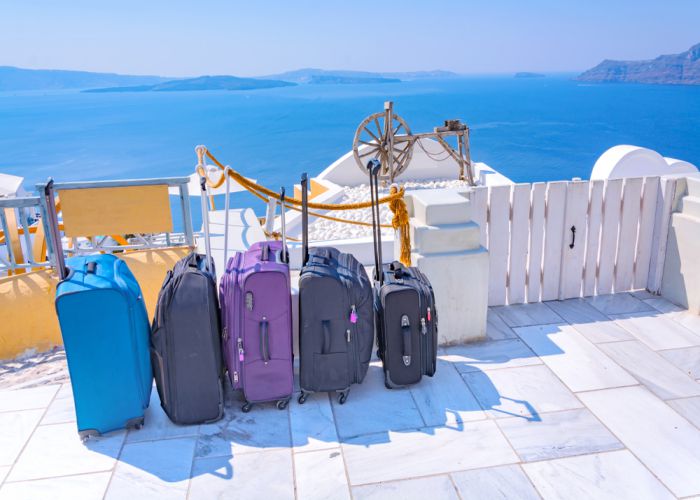
Traveling to Greece offers a cornucopia of historical, cultural, and natural attractions , from ancient ruins to sun-drenched islands.
While Greece is generally considered a safe destination, recent travel advisories highlight the importance of staying informed and preparing adequately.
Pre-travel preparations, such as enrolling in the Smart Traveler Enrollment Program and checking health notices, are advised to safeguard against unforeseen incidents and medical emergencies.
Visitors should also familiarize themselves with local customs and safety considerations specific to Greece to avoid any cultural misunderstandings.
Once in Greece, navigating the bustling cities and tranquil islands poses different considerations.
In major cities, tourists should remain vigilant, especially in crowded areas, to minimize the risk of petty theft.
On the islands, water safety and transportation require attention, to ensure a pleasurable experience.
Road safety is also a factor visitors should keep in mind regardless of the destinations they choose to visit in Greece.
To drive a vehicle, they need to carry an international driving permit and familiarize themself with the sometimes "passionate" Greek style of driving.
Lodging choices also contribute to a safe stay, and selecting reputable hotels can provide an added layer of security.
Awareness of emergency contacts, including local police authorities and one’s embassy, can provide reassurance and quick assistance if challenges arise during the trip.
Understanding Safety in Greece
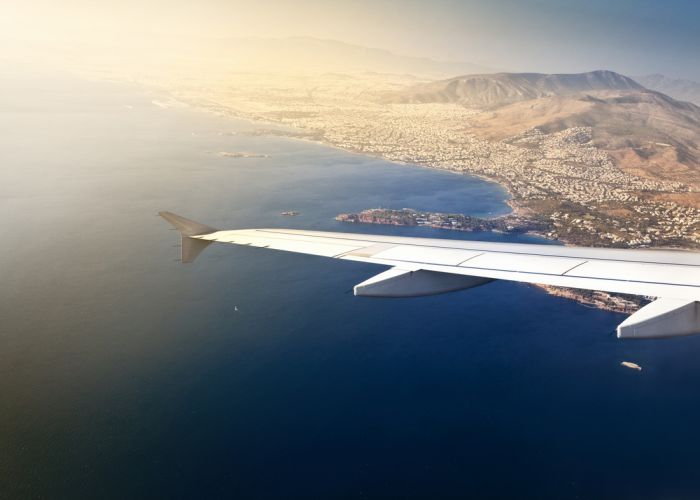
General Safety Levels in Greece
Greece is known for its welcoming culture and is generally considered a safe destination for tourists .
The country's safety level is comparable to most Western standard countries, where incidents of violent crime are relatively low.
However, like many popular tourist destinations, petty crimes such as pickpocketing and theft can occur, particularly in crowded areas.
Tourists are advised to remain vigilant, especially in tourist-heavy locales, and be ready to go to the nearest police station if anything comes up.
Comparison With Other European Countries
When compared to other European countries , Greece tends to have lower levels of violent crime.
The euro has brought about economic stability which, in turn, contributes to the overall safety of the nation.
However, Greece has seen protests and political unrest in recent years, which is something tourists may encounter more frequently here than in some other Western and Northern European nations.
- Violence : Significantly lower than the European average
- Petty Crime : Comparable to other tourist destinations in Europe
- Terrorist Attacks : Rare with minimal incidents in comparison to other European localities
The Greek Government's Efforts in Ensuring Safety for Tourists
The Greek government prioritizes tourist safety , aware that tourism is a significant contributor to the economy.
Measures include a visible police presence in tourist areas and regular briefings for tourists on current safety information.
Local authorities have made efforts to minimize the impact of protests and political incidents on tourists, ensuring that major tourist sites remain open and accessible.
Pre-Travel Preparations for a Safe Trip to Greece
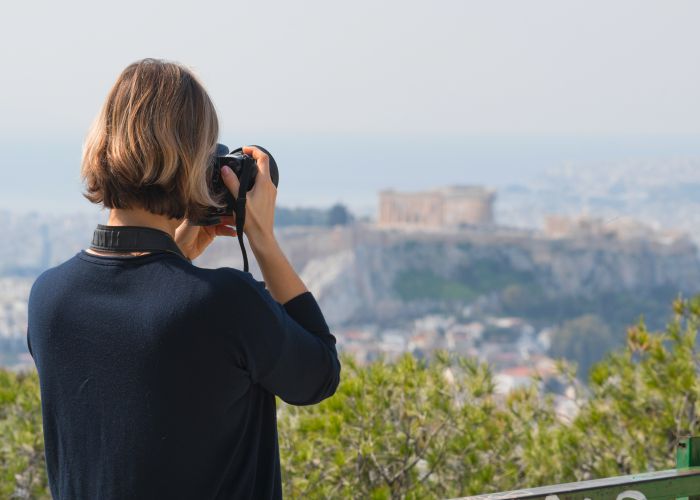
When planning a trip to Greece , ensuring safety starts with thorough pre-travel preparations.
These preparations include obtaining the appropriate travel insurance , staying updated on health advisories, and keeping your country’s embassy informed of your travel plans.
Importance of Travel Insurance
Travel insurance is a crucial investment for any traveler.
Before venturing to Greece, individuals should ensure that their travel insurance covers overseas medical treatment expenses, including medical evacuation .
It should also account for the loss of belongings, theft, and trip cancellations.
U.S. citizens are reminded that the U.S. Embassy in Athens does not cover medical expenses and that the U.S. Department of State strongly recommends maintaining substantial travel insurance during abroad travels.
- Medical coverage
- Trip interruption
- Loss or theft of personal belongings
Necessary Vaccinations and Health Preparations
Travelers should consult the Centers for Disease Control and Prevention (CDC) for recommended vaccinations before departure.
Vaccinations should be up-to-date and may include routine vaccines as well as those specific to travel in Greece.
As of the last update before 2023, there was no mandatory vaccination for travelers unless they came from or visited a country with a risk of Yellow Fever transmission.
A health professional can provide the most current advice and medical services regarding any health concerns, potential outbreaks, or vaccination requirements.
It is also advisable to carry sufficient prescription medication for the trip's duration and a copy of the prescription.
Registering Travel Plans With Your Country's Embassy
U.S. citizens should leverage the Smart Traveler Enrollment Program (STEP) , a free service offered by the U.S. Department of State.
It enables the State Department to assist U.S. citizens in the case of an emergency and provides important safety information from the embassy about conditions in Greece.
Enrolling in this program also allows the embassy to contact travelers in an emergency, whether natural disaster, civil unrest, or family emergency.
- Obtaining important and updated safety information
- Allowing the U.S. Embassy to contact you in case of an emergency
- Making it easier for friends and family to contact you if necessary
Travelers from other countries should check if their government offers a similar service and register their travel plans accordingly.
Safety Tips for Traveling in Greek Cities
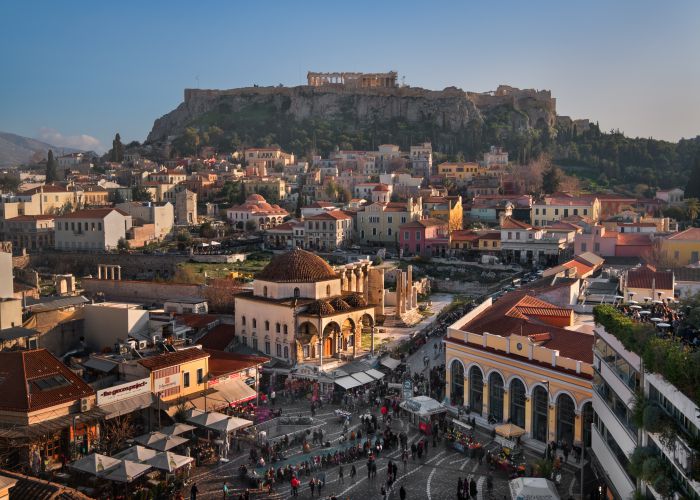
When exploring Greek cities like Athens , Thessaloniki, and Heraklion, tourists should remain vigilant to petty crimes and stay informed about safe transportation.
It's also crucial to be aware of potential scams and tourist traps.
Awareness of Petty Crimes Such as Pickpocketing
Athens and Thessaloniki are bustling metropolises where tourists can sometimes fall victim to petty crimes such as pickpocketing , especially in crowded areas. To minimize risk:
- Stay alert in tourist-heavy areas, near ATMs , and on public transport .
- Use money belts or hidden pockets to secure cash and cards.
- Keep valuables out of sight and carry bags that close securely.
Safe Transportation Methods
Navigating the cities can be safe and efficient when using proper transportation methods. For safe travel:
- Opt for official taxis or reputable car hire services .
- When using public transport like the Metro, keep personal belongings close.
- Verify airport transport options with your hotel for additional security.
Avoiding Scams and Tourist Traps
Tourists could encounter scams or tourist traps at popular destinations, bars, and restaurants. To protect themselves, they should:
- Be skeptical of unsolicited help or friendly locals insisting on guiding them or taking them to a specific place.
- Agree on prices before accepting services, especially in bars and restaurants .
- Double-check bills and receipts to ensure charges are accurate.
By adhering to these guidelines, travelers can enjoy a safer experience while soaking in the rich history and culture of Greek cities.
Island Safety in Greece

Traveling to Greece's islands can offer tourists picturesque beaches and a unique cultural experience, but safety considerations vary between the mainland and the islands, as well as from one island to another.
Differences in Safety Between Mainland and Islands
Greece boasts a plethora of islands, each with its own character and level of tourist infrastructure.
In general, islands like Santorini, Mykonos, and Rhodes are well-equipped to handle tourists, especially during the summer season when visits peak.
Mainland Greece :
- Higher population density
- Diverse urban environments, from tranquil towns to bustling cities
Greek Islands :
- Typically lower crime rates than the mainland
- Some islands are more remote, which can affect emergency services' response times
Places such as Santorini and Mykonos are known for their affluence and strong tourism focus, which often means a significant law enforcement presence and well-maintained facilities.
As a result, tourists tend to feel secure while visiting these popular islands. However, visitors should remain vigilant as petty thefts like pickpocketing can occur, especially in crowded areas.
Specific Considerations for Island-Hopping
Island-hopping is a popular way to experience the variety of what Greece's islands have to offer. It's essential to plan and be aware of the specific safety considerations associated with moving from island to island.
Travel Precautions :
- Check local weather conditions regularly, as they can change rapidly and affect ferry services.
- Opt for reputable ferry and tour operators.
- Be mindful of your belongings during transits.
Seasonal Considerations :
- Summer months typically see an influx of tourists, which can lead to crowded spaces. Visitors should be attentive to personal belongings and be cautious in the vibrant nightlife scenes.
- In contrast, the off-season may find some islands with reduced services, and visitors should verify accommodation and transport availability in advance.
Each island has unique characteristics that can affect safety.
For example, while Corfu might have a lively environment with a strong tourist police presence, more isolated islands may not offer the same level of immediate assistance.
Tailoring expectations and preparations for each island's offerings will ensure a safer and more enjoyable experience.
Safe Accommodations in Greece

When traveling to Greece, tourists' safety is paramount, particularly when selecting where to stay.
Safe lodging options are readily available throughout Greece, ranging from hotels with robust security measures to resorts that are vigilant about guest safety.
Choosing Safe Lodging Options
Tourists should conduct due diligence by reading trusted hotel reviews and booking platforms that provide reliable ratings.
It's recommended to opt for accommodations with a consistent record of positive feedback regarding safety.
Hotels and resorts throughout Greece offer a plethora of choices for safe accommodations.
Key factors to consider when choosing a lodging option in Greece include:
- The location of hotels or resorts, with preference given to well-lit and well-traveled areas.
- The presence and quality of on-site security measures.
- The hotel's or resort's reputation and management's commitment to safety protocols.
Safety Features to Look for in Accommodations
When booking a place to stay in Greece, one should be attentive to the following safety features which enhance the security of accommodations:
- 24/7 Reception : A front desk that is manned at all times can provide an extra layer of security.
- Surveillance Cameras : Properly installed cameras in common areas deter unauthorized access and monitor for suspicious activity.
- Room Security : Guests should look for accommodations offering in-room safes, key card access, and secure locks.
Hotels and resorts across Greece, especially in safer regions, are often equipped with these features, ensuring a protected environment for guests.
Emergency Information for Safe Travel in Greece
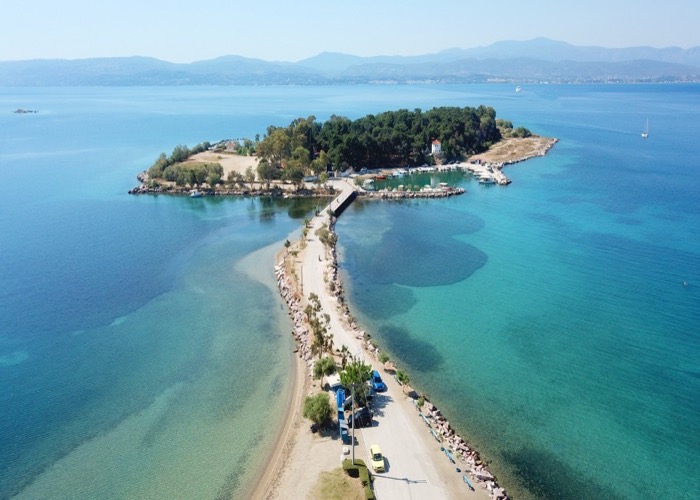
When traveling to Greece, it's essential to be aware of the key emergency information to ensure a safe trip. Tourists should take note of emergency contact numbers, and the locations of embassies and consulates, and have an understanding of the Greek healthcare system for immediate assistance in case of an emergency.
Key Emergency Contact Numbers
- General Emergency: 112 (European Emergency Number)
- Ambulance Service: 166
- Fire Brigade: 199
- Police: 100
- Coast Guard: 108
It is also recommended that tourists save the contact number of their country's embassy or consulate on their personal devices.
Locations of Embassies and Consulates
Tourists can seek assistance and support at their country's embassy or consulate. Here are contact details for the U.S. Embassy in Athens :
- Address: 91 Vasilisis Sophias Avenue, 10160 Athens, Greece
- Telephone: +(30) 210-721-2951
- After-Hours Emergency: +(30) 210-729-4444
Understanding the Greek Healthcare System
The Greek healthcare system consists of both public and private medical facilities throughout. In the event of a medical emergency, hospitals and doctors are readily available.
While public hospitals may face severe traffic congestion, tourists can access private healthcare providers for faster service.
Pharmacies are widely available and can be identified by a green cross sign. It is suggested to have comprehensive travel insurance to cover potential medical costs.
Cultural Considerations for Safety in Greece
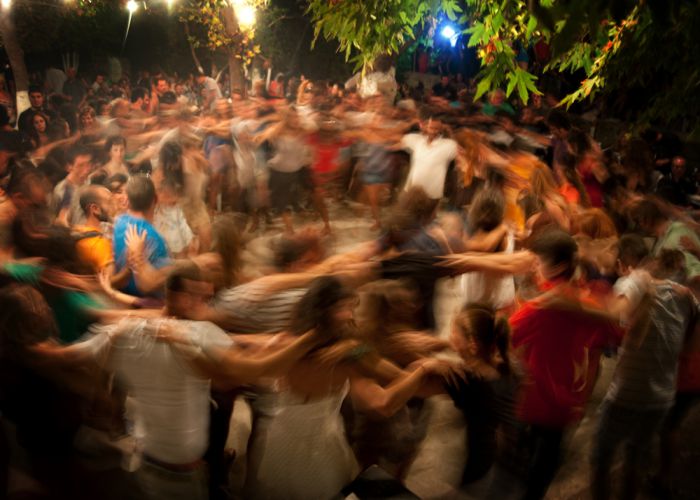
Respecting Local Laws and Customs
Greece has a rich cultural heritage and deeply rooted traditions. Tourists must adhere to local laws and regulations, which may differ from those in their home country.
For example, the country has strict laws against the desecration of archeological sites , and violations can result in heavy fines or imprisonment.
Visitors should also be sensitive to local customs, such as quiet hours typically observed in the afternoon and specific social courtesies like greeting shop owners when entering establishments.
Dress Codes and Behavior
Dress codes may vary depending on the location within Greece.
While casual attire is acceptable in most places, more conservative clothing should be worn when visiting monasteries or churches; women should wear long skirts or dresses, and men should wear long trousers.
Behavior at these religious sites should be respectful; speaking in a low voice and avoiding any form of disruptive conduct is expected.
Safe and Respectful Interaction With Locals
Tourists can enhance their safety in Greece by interacting with locals respectfully.
Learning a few basic phrases in Greek can be seen as a sign of respect and can greatly improve interactions.
Tourists should also be aware of gestures that may be considered rude in Greek culture .
For instance, the hand gesture known as 'moutza,' showing the palm with extended fingers, is offensive in Greece and should be avoided.
Understanding these social nuances can prevent misunderstandings and ensure a safer visit.

Food and Water Safety in Greece

When traveling to Greece, tourists should maintain a high standard of hygiene and be mindful of their Greek food and water choices to ensure a safe and enjoyable experience.
Recommendations for Dining Out
In Greek restaurants, the safety of food is taken seriously, and strict food hygiene standards are often upheld. Tourists should observe the following practices:
- Inspect food temperatures : Cold dishes should be served cool, while hot dishes should be served hot. Avoid any food items at buffets or salad bars that are not at their proper temperature.
- Hand hygiene : Always wash hands before eating, or consider carrying a small bottle of hand sanitizer .
- Seek out reputable eateries : Places with a high turnover of locals are typically a good sign of fresh, safer food choices.
Drinking Water Safety
Concerning drinking water safety in Greece, the following specifics are of importance:
- Mainland and urban areas : Tap water is generally safe for consumption in mainland Greece and in urban areas for both drinking and cooking.
- Greek Islands : Water safety can be variable; tourists are advised to inquire locally or opt for bottled water.
- It is advisable to avoid tap water for those with sensitive stomachs or in more remote locations.
By adhering to these focused guidelines, tourists can minimize the risk of food and water-related illnesses and ensure a pleasing culinary experience while enjoying the rich flavors of Greece.
Safe Travel in Greece During COVID-19
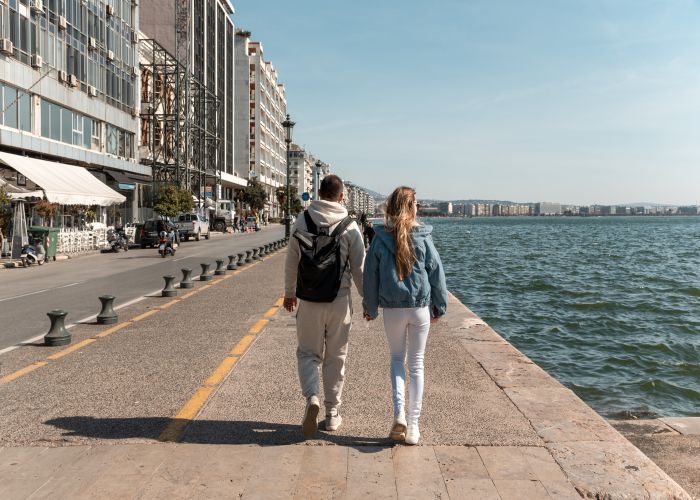
Traveling to Greece has become more straightforward as the country has eased many of its COVID-19-related travel restrictions. Visitors should stay informed about the current situation and the health measures still in place to ensure a safe trip.
Current COVID-19 Situation in Greece
As of the latest updates, Greece no longer mandates filling out a Passenger Locator Form (PLF) for incoming travelers. Moreover, proof of vaccination, recovery from COVID-19, or a negative test result is not required upon entry, regardless of the traveler's origin.
This move signifies Greece's approach to normalcy and its effort to revive tourism.
Health and Safety Measures for Travelers
While many restrictions have been lifted, travelers should exercise personal responsibility.
The Centers for Disease Control and Prevention (CDC) recommends that individuals stay up to date with COVID-19 vaccines .
Masks may be required on public transport and in some indoor spaces , following guidelines set by the National Public Health Organization .
The Athens International Airport and other transport hubs may have facilities such as wheelchair services, which adhere to sanitation protocols for the safety of all passengers .
Impact on Tourist Experiences
Despite the easing of restrictions, the traveler's experience may differ from pre-pandemic times.
Tourists can visit public spaces and cultural sites like museums without showing a COVID-19 vaccination certificate , which allows for a more seamless travel experience.
However, it is still important to respect any local health advisories and to exercise caution in crowded places to minimize health risks.
Final Thoughts

Travelers considering Greece as a destination can be assured based on current data and reports.
Greece has a reputation for being a country with a low crime rate , especially in comparison with other Western European nations. Safety measures in place continue to make it a viable option for tourists.
The COVID-19 pandemic 's impact has been managed effectively in Greece, with safety protocols adapted to protect both residents and visitors.
It is always prudent for travelers to stay informed about the latest health and safety guidelines issued by the Greek government and international health organizations.
For those in the United States, checking the U.S. Department of State’s Travel Advisory for the latest updates is a recommended step before planning any travel.
Additionally, enrolling in the Smart Traveler Enrollment Program (STEP) can provide timely security messages and assistance in case of emergency.
When in Greece, travelers should exercise the same precautions they would when visiting any foreign country.
This includes being mindful of personal belongings, staying aware of their surroundings, and respecting the local authorities, laws, and customs.
In terms of travel experiences , visitors will find a rich tapestry of history, culture, and natural beauty that Greece is renowned for.
From the ancient ruins of Athens to the stunning beaches of the Cycladic Islands , the country offers an array of attractions for every type of traveler.
Hence, with the right preparations and precautions, those looking to visit Greece will likely have a safe and enriching travel experience.
Frequently Asked Questions
What is the current security level for travelers going to greece.
The U.S. Department of State typically provides a security level rating for travelers considering visiting foreign countries, including Greece.
It's essential to check the latest travel advisories for current information on the security level before planning your trip.
Are there any specific areas of Greece that are considered particularly safe for tourists?
Greece generally maintains a reputation for being safe for tourists, with many areas having a strong tourist infrastructure. That said, you should exercise normal precautions, especially in larger cities like Athens, where pickpocketing and petty theft can occur.
How has the situation between Israel and Hamas impacted travel to Greece?
Fluctuations in regional tensions can affect travel; however, Greece has not been directly impacted by recent escalations between Israel and Hamas.
What precautions should U.S. citizens take when traveling to Greece during this period?
U.S. citizens are advised to stay informed on local laws and customs. They should also keep their travel documents up to date and remain vigilant about their personal security. Additionally, it is recommended to register with the Smart Traveler Enrollment Program (STEP) for more travel advice and alerts.
Are there any COVID-19 considerations for travelers visiting Greece?
There are no current COVID-19 restrictions in Greece according to the government and Hellenic Civil Aviation Authority.

- English (EN)
- Español (ES)
- Português (BR)
Is Greece Safe? Crime Rates & Safety Report
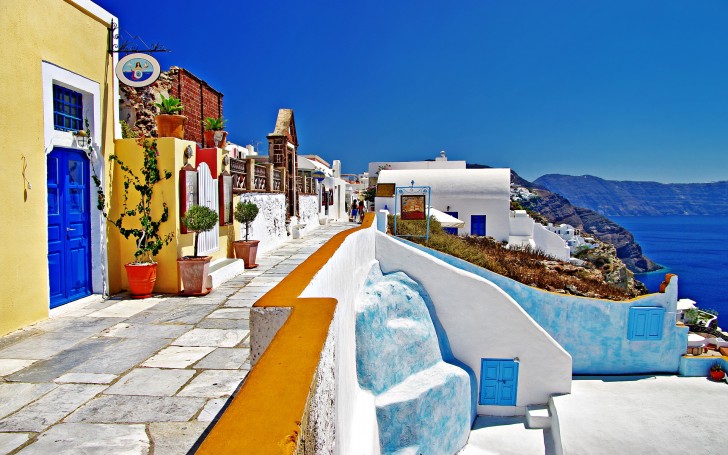
- Greece : Safety by City
- Thessaloniki
Greece is a European country often referred to as the cradle of Western civilization and culture.
It has had a huge impact on European art, culture, history, philosophy, language, etc.
It is brimming with historic artifacts and remains of its history that tourists and visitors rush to see every year, and to top it all off, it also flaunts its gorgeous turquoise coastline, one of the prettiest ones in entire Europe.
It’s got around 6,000 islands, sandy beaches and clear waters, bright as day.
Greece really is a dream for tourists, and while it is generally safe, there are parts of it that should be avoided if possible.
However, following basic common sense and watching out for any possible dangers should get you through the trip smoothly.
- Warnings & Dangers in Greece
OVERALL RISK: LOW
Greece is a very safe country to travel to. Tourists are unlikely to experience any crime or violence. The only concern is petty crime on the streets, but if you apply the basic precaution measures, your trip should go smoothly.
TRANSPORT & TAXIS RISK: LOW
Taxis and other means of transportation are, overall, very safe to use in Greece.
PICKPOCKETS RISK: MEDIUM
Pickpocketing and bag snatching does exist, but it's not as common as you would expect. Picpockets usually lurk around popular tourist destinations and big cities like Athens, but applying simple precaution measures should minimize this risk.
NATURAL DISASTERS RISK: LOW
Other than the ever-present risk of drowning at sea, there are no other threats in Greece when it comes to natural disasters.
MUGGING RISK: MEDIUM
Greece is relatively safe when it comes to mugging or kidnapping. It rarely happens to tourists, but you should avoid dangerous areas. Ask around for advice or in local tourist organizations regarding what parts of Greece to avoid.
TERRORISM RISK: LOW
Even though there haven't been any terrorist attacks in Greece's recent history, they shouldn't be ruled out.
SCAMS RISK: MEDIUM
Since Greece is a top tourist destination, it is no wonder that people will try to scam you, especially during summer when the number of tourists increases. Watch out for street vendors trying to rip you off and overcharge for their service, double check the authenticity of everything you want to buy as well as the change you receive and negotiate everything in advance.
WOMEN TRAVELERS RISK: LOW
It is very safe for women to travel to Greece. Just following common sense and applying basic precaution measures (not walking around in the dark, in empty streets, not finding yourself alone with strange men) should ensure that your travel goes without any incidents.
- So... How Safe Is Greece Really?
Greece is very safe to visit.
Ranked 39th on the ranking of world’s safest countries, it is very welcoming towards its tourists and risks that are listed here are unlikely to happen, and even more so to tourists, but they shouldn’t be ruled out due to the serious economic crisis Greece is in and due to the fact that it really is a top tourist destination.
Pickpocketing and bag snatching are serious issues in Greece, especially around tourist landmarks and in crowded places, so it would be best to either leave your money at your hotel or just carry it in a very safe place near your body so it couldn’t get snatched.
Never carry all your money in the same place. Even though petty crime is common, violent crime is unlikely to happen.
The only thing that can happen is fights between intoxicated tourists on the streets and even that doesn’t happen more than it would in any other country.
Since the economic crisis, there have been some organized protests happening in Greece, which can lead to fights between the police and the protesters so you should avoid any kinds of public gatherings connected to the politics, for your own safety.
Apart from looking out for your belongings and staying vigilant for any pickpockets, you are unlikely to experience any crime in this gorgeous country.
- How Does Greece Compare?
- Useful Information
Visas for Greece are usually not required for any stays lasting less than 90 days, and EU residents can stay in the country for as long as they like. Your passport should be valid for at least six months past the date of your return from the country you are visiting. However, if you are not sure about your visa status, visit www.doyouneedvisa.com which will let you know whether or not you need visa based on your nationality.
Euro is the official currency in Greece. You can exchange your money in exchange offices and banks all around Greece, and use ATMs normally. There are, however, some restrictions when it comes to the amount of money you can withdraw per day. Greece is relatively cheap compared to other European tourist destinations, so you can count on spending between 60 and 80€ per day.
The weather in Greece is sunny and warm during summer, mild during autumn and spring and cold during winter. It has all four seasons of the year, although they are milder. The best time to visit is during summer, from May to September, although you should count on major crowds along the coastline at that time of year. Major cities can be visited all year long.
The busiest airport in Greece is Athens International Airport, located in Athens, and the second busiest one is Heraklion International Airport.
Travel Insurance
Just like anywhere else, we recommend getting travel insurance when traveling to Greece, since it covers not only the costs of medical problems, but also theft and loss of valuables.
Greece Weather Averages (Temperatures)
- Average High/Low Temperature
Greece - Safety by City
Explore greece.
- Are There Snakes in Greece? Should You Be Worried?
- 10 Most Dangerous Cities in Greece
- 16 Pros And Cons Of Living In Greece
- 5 Safest Cities In Greece
- 11 Most Beautiful Castles in Greece
- Are There Sharks in Greece?
- Greek Islands on the Aegean Sea: The Most Picturesque!
- 7 Unforgettable Greek Desserts You Should Try
- Top 7 Exciting Activities in Kalamata, Greece
- Top 10 Most-Desirable Beaches in Mykonos
- Where to Next?

51 Reviews on Greece
Stunning islands, recommended.
My family visit Greece every other year! Last time we went to Kos, and although the vacation was boring compared to others, it’s still a very safe and beautiful country. We’re going to Naxos next year following the advice of my parents. I’ve also been to Rhodes, Corfu and Santorini, always a pleasure. Just be careful of street scammers, there are quite a few but are usually easy to spot.
Crete island,you love it.
Safe and beautiful
I travel to Greece once a year to visit my father who never wanted to leave his homeland. I go to Ikaria which is a stunning island with a beautiful blue sea. The ratings on this page are correct but I have to point out that there have been terrorist attacks in Greece, although most have been non-fatal. That aside, you won’t have problems in Greece.
what terror attacks?
What terror attacks?!! Where?
Nice country
I have loved every trip to Greece. I have been there a total of 5 times. I plan on going this year again. The only drawback is for people who are either allergic to cats or don’t like them. My wife, unfortunately, has a cat allergy so it made both our trips there together a bit tricky!
Why cats do they have too many
Only on miow miow island
Greece is not safe pick picketers all over please don’t go the police not friendly
you are right, its the heaven for pick pocketers, I have lost some 800 euros, police just written a complaint to give a receipt for getting insurance if possible..dry city, just ruins are there. not worth to visit as it was a name once.
THE TEAL GREECE....ITS FABULOUS
THIS SIMPLY IS NOT TRUE…….the Grrek people are lovely honest and friendly ….crime is very low and almost always carried put by immigrants from Africa or Arabia..even then this is restricted to pick pockets or bag snatching.. but this is just in the big cities…..on the islands the locals leave there keys in cars when parked!!!
Absolutely. You’re right. It’s very safe. I only ever had a few problems with children who threw stoned at me thinking I was a tourist. I think their parents must have had a bad experience with tourists and their children ganged up on me and pelted me with stones on the way home from supermarket in broad daylight. My husband later wen
Dry Dusty City with only relics? Not the Greece, I visited back in ’21. Went in early October weather was breezy towards the evenings but otherwise OK. Loved the beach on Naxos though the one on Paros was filled with jellyfish that hurt. People friendly and helpful and even more when you can speak a little Greek, you’d be surprised how many doors that can open.
You must be a Turk
Beautiful Country, Beautiful People
The scammers and pickpockets are in the tourist-filled areas. Visit the villages and places that aren’t tourist traps and you’ll find that Greeks are good people who can be trusted.
Hospitals jammed if you getbsick or are injured, you are on your own. Save Greece for when pandemic is over. Andrew
Precisely And if you are sick or meaten by a thug, hospitals are full. Don’t go to Greece, especiallynAthens ubless you are a glutton for punishment. Andrew
Pickpocket risks should be high
Got pickpocketed on the first day in Athens metro. Crazy cus we have taken extra precautions. Other places were amazing. Except we can’t hang around places like Monastiraki square without being bothered, approached or scammed!!!
I wana hoi grcee
Amazing Greece
Amazing and safe place to travel
I would love it if you could send me a free Visa of one month to see how the counter is
Don’t knh abt it
Went to Rhodes for many years . Loved Pefcos ,but as we got older it became to hilly for us .So now we go to Zante. Love Greece and the people. They are so friendly
the safest and most beautiful country to visit on the Mediterranean Sea
Amazing capital city of Athens with Acropolis and all the ancient history, traditional food (souvlaki, gyros), the center of ancient Greek civilization. The beautiful tropic Greek islands (over 3.000) with the combination of amazing Mediterranean weather, the crystal sea and wonderful beaches, the always shining sun and the night life (Mykonos, Santorini, Corfu, Rhodes, Kos, Crete etc)
you must visit Greece at least one time in your life and you defiantly going to enjoy it!
This site is spreading total lies and misinformation.Do not believe it. Crime rates and road safety are at hell right now. You better go to Iran. Dressed as a Jew. No offense. Government doesn’t care and you’re better off with the hope of someone random finding you instead of the police. Overall, you’ll be mugged, murdered or driven to insanity by other drivers. Have a great evening everyone. Away from Greece .
u r right, i support yr statmnt
Based on what evidence / statistical data?
Imagine visiting Greece and thinking is just like Iraq / Iran ! I do not know where you live , but i do not think your view is representative of the country. Your name maybe Afroxylanthi , and maybe you live in some of the slums in Athens but the overall crime rate in Greece especially now is well below the average in EUROPE.
When arguing online about something so vital it is good to present facts and not just an opinion. This is the current trend of the crime rate.
It is the lowest its ever been. Greece is much more safer now than it was 10 or 20 years ago! Do not mislead people. Its also good to mention that the overall C02 emissions of Greece have been reduced back to the 1980s period !
Do not assume that a situation affecting your specific region is the same for the whole country. Have a nice day ! I hope i shed some light in to this whole thing! Also if there are statistics that prove otherwise i would be happy to give them a thorough check ! i could not find any in my research!
I used Bing , Google and Qwant to find the aforementioned Results
Here to dismantle propaganda of Afroxylanthi
Your name is not Afroxylanthi and you most probably are a paid troll or somebody who just doesn’t like that Greece is getting so many tourists in comparison to your country (whatever that might be, doesn’t interest anybody). Just because a random troll like you writes a toxic comment without any proof, doesn’t mean we have to take your word for it.
Greece is overall very safe. You can google up US Travel Advisory and figure it out yourself. The crime rate in Greece has historically been amongst the lowest in Western Europe, and continues to be. in 2017, only 78 homicides in a population of 10.5mio. A record 10-year low. So you can shove your “overall, you’ll be murdered in Greece” somewhere else. Maybe in your third-world country you crawled out from.
Police corruption is the lowest in the Balkans. There is not a single case of police officers trying to get money from you. Maybe this happens in your country, so you are salty that Greece has a Western style, non-corrupt police force. Grow up and get over it.
Traffic is indeed a thing in Greece. You have to be careful, since most of the Greek people drive offensively. That’s why Greece has high accident rates. So somebody has to be extra careful when crossing a street or driving, especially two-wheeled motorbikes. But this is common sense, since you are in a foreign country.
You are totally wrong I go to Greece every year ! My wife which is an USA citizen, loves Greece No one bothered us
I have been going to Greece every year for the past 40 years. You are being mendacious.
Disinformation
Totally inaccurate. Otherwise how you explain that millions of tourists visit every year. I go regularly. You have a point about driving. Very aggressive drivers. (I am one of them:). If you can drive in NYC you are good to do in Athens. Otherwise use taxis.
wow, have been to Greece and it is totally safe, honestly cannot compare to other countries and people are extremely friendly. Loved it and extremely beautiful.
I was robbed in the hotel at the ATM as well as in the train in Athens. Not a single cop could be seen in metro area. Travel at your own risk. Also found others who were robbed.
Amazing country, but high risk of pickpocketing, be careful about your stuff all the time. Also, Athens is very dirty and drivers don’t care about your or their life so be careful in traffic. Great food.
Afroxyl is attention seeking. He’s never been out of his mother’s basement.
Stay away from Athens
Athens is a very dirty city. Totally unacceptable. Police does not seem to want to emforce the law. Hordes of illegals and gypsies are everywhere. Very sad but true. The amazingly clean metro system is full of pickpockets and gangs of gypsies and there is no police to be seen. Clearly the country side is more safe.
Greece is actually a very safe country, there is a high risk of pickpockets but take precautions and you’ll be fine. Besides, Greece is 1 of the lowest countries in Europe with police corruption, so don’t believe the comments about corrupt police
I am look for a job
My LOVE FOR GREECE
Love Greece to the max , beautiful friendly people,visited many islands , a favourite SYROS ISLAND ‼️Go to Rome & see how dirty that is & lots of Gypsies !! As An Australian our love for Greece is up for here & we are dying to return to our favourite islands & friends . Have never experienced theft , abuse or scammers!
As a civilian of Greece,stay away from here. Police violence is out of control. We are under strict lockdown since the starts of November 2020. Prime minister will open the lockdown only if tourists come,he does not care for us. 40% of the bars,cafes, restaurants etc. are closed permanently. We are under dictatorship
Beware of the tricksters commenting on this site!
Sounds to me that these naysayers know the truth so who are they and why would they insist on spreading propaganda? I will venture a guess, they are probably Greek Residents that hate tourism and wishes he did not have to encounter tourists. What better way to scare people off than to make them think they may not make it back alive! The stats speak for themselves though so I will just say.. Nice Try!
I wouldn’t really agree woth Greek C.
I’m Greek, and live in Athens, but always wished for more tourists. 🤩
I love when tourists come over to visit us!! It’s always a pleasure to have them here 😄🇬🇷
This is misleading, Greece currently has a junta and police brutality and they do not care about anyone’s health, longest lockdown, most covid deaths in europe etc
Wrong, wrong and more wrong.COVID cases amongst lowest in Europe per capital. I have traveled to Greece six times and find it one of the safest places to visit. All large cities have problems with crime and traffic. I choose islands, small towns and villages when I travel abroad.
The safety of Greece by a Greek
I am Greek and I live in a bad rumoured area of Athens. The only real problem in Greece is pickpocketing. But if you aware areas (in Athens) like Gyzi, Sepolia, Kato Patisia, Exarchia, Omonia and Menidi there is no problem in the rest of Athens. As Greek I recommend Greece I am sure you will not regret it.
Be aware always
Overall, Greece is a lovely country. That said, Athens can be treacherous as there are many pickpockets especially around the travel hubs like ports and train stops. I have travelled all around the world and Athens is the only place I was robbed. Be smart and aware of your surroundings at all times- true of any place you travel. And do not look like a tourist!! Do not wear expensive clothes and especially no jewelry!
Great visit to Greece, despite event of pickpocketing.
We visited Athens, several cities and areas on the Peleponese penninsula and the island of Amorgos in 2019. We suffered pickpocketing on the subway from airport to hotel in centra Athens on the first day in Greece. Lost phone and credit card. Despite that, it was one of the best trips we have ever had. We made some mistakes in security. I pulled out my phone and talked to seemingly friendly strange and fellow travelers, but they may have been part of the scam. Our hotel host was amazingly helpful in dealing with this. My husband got all his wallet contents back, and lost only cash. Of course, it was unsettling, but not terribly painful. We are returning in Sept 2021 and look forward to it.
Our summer heaven
Greece has been our summer go-to destination for over 10 years. Since their economy went through so many crashes some people are left in extreme poverty. Yes, this doesn’t justify robberies or pickpocketing but at least it provides a good background to understand the why. I’m paranoid by default so I always keep as little money on me as possible. Also, no to fancy jewelry or flashing your phone.
So many options
Greece will forever be a top destination for our little summer getaway! Our first vacation there was in 2015 and we have come back every year since.
Having visited different locations every time I can safely say that you get a different experience depending on what you decide to visit.
Safety-wise, most problematic areas are in bus stations, crowded markets or regarding belongings left unattended on the beach. We had zero problems so far but we’re the kind of couple that always looks out four times before crossing the road haha. If you’re on an island and stay at a resort it’s obvious you won’t have any problems. If you explore ruin sites or any other touristy crowded destination I would suggest keeping your phone, spare change and ID safe, they have some very slick pickpockets, especially the children.
There are tons of villas on Airbnb that even offer accommodation for pets so don’t rush into booking a suite. Sometimes trendier destinations are way overpriced while also offering the bare accommodations – we got screwed once, never again.
Santorini is great for a couple escape, they have one of the most luxurious hotels. Canaves Oia Suites was a lucky win for us. We knew we wanted to visit Oia when this gorgeous village started pooping on our insta quite a lot.
Kefalonia, Lefkada, Corfu, these are great family destinations with activities for the whole family.
If privacy is a huge issue for you, I would definitely check Serifos. My wife was the one who booked this stay where we managed to relax like never before. Blue waters, quiet beaches, a modern paradise.
Travel insurance is a must, we never travel without, especially when traveling abroad. Since covid is still present and flights can be delayed at any moment this gives us some peace of mind.
My son lives in Greece. I visit often and when he at working I go shopping. My camera was stolen and found the people very rude. They are only nice when you are in a tourist area.
Not so safe for women, but a beautiful place to travel
This says that Greece is safe for women but I found Crete to be extremely unnerving to travel around as a woman. The island itself was awesome and I would recommend it generally but I was with my sister and her friend and I swear 95% of the men we passed by would cat call and actively chase after us (even turning around on the road and chasing after us in their cars and scooters).. that may be a slight exaggeration from memory but not by much. If you look Greek no one will bother you but if you are pale skinned with lighter hair and lighter eyes oh man… it was crazy. And yet no one warned us about this and I haven’t heard anything about it since! This was a while ago now so maybe things have changed a bit but I would really question the high safety rating given here – it’s a bit deceiving.
Never been but wondering how safe for young teenage boys & girls. Kidnappings?
Share Your Experience Cancel reply
Your Review
Title of your review
Article Contents
- Overall Risk
- Transport & Taxis Risk
- Pickpockets Risk
- Natural Disasters Risk
- Mugging Risk
- Terrorism Risk
- Women Travelers Risk
- Weather Averages (Temperatures)
- User Reviews
- Share Your Experience
Popular Destinations

Safety Index
Recent reviews & comments.
- Patrick Jones on Kearney
- Kristian Tucker on Kearney
- Howard Clinton on Kearney
- Benny Alberts on Kearney
- Luis Cruz on Kearney
Popular US States
- Pennsylvania

Search Smartraveller

Latest update
Exercise normal safety precautions in Greece.
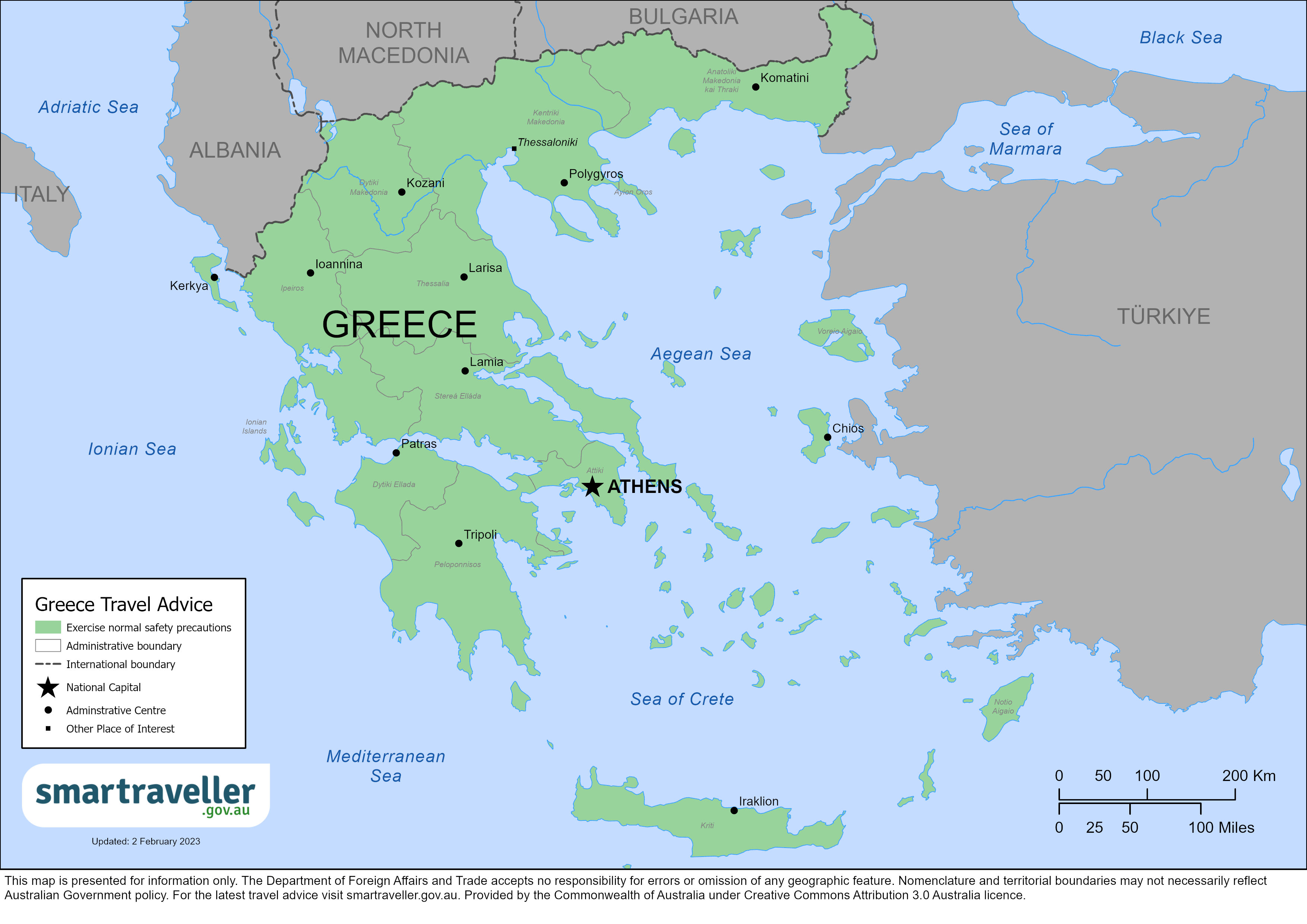
Greece (PDF 325.12 KB)
Europe (PDF 2.62 MB)
Local emergency contacts
Fire and rescue services, medical emergencies, advice levels.
Exercise normal safety precautions in Greece.
- Extreme temperatures are affecting many areas of Greece, and more wildfires are possible throughout the summer months. Contact your travel provider and monitor the media for the latest updates. Read our advice on what to do if you're overseas and there's a bushfire near you .
- Strikes, protests and demonstrations take place regularly and can turn violent. Rioting can break out with little warning. Violent clashes have occurred between supporters of rival football teams. Avoid affected areas, monitor media and follow the advice of local authorities.
- Petty crime and theft are serious issues in tourist areas and on buses and trains. Pickpocketing, bag snatching, and slashing luggage to steal belongings are common. Pay close attention to your belongings.
- Terrorist attacks have occurred at or near popular tourist areas in central Athens. Always be alert. Take official warnings seriously.
Full travel advice: Safety
- Heatwaves are becoming more frequent over the summer months. Drink plenty of water, wear light clothing, stay in air conditioning or shaded areas, and follow the advice of local authorities.
- Dust storms occur in Greece, particularly during Spring.
- Medications such as codeine are subject to special rules. Carry a prescription and a letter from your doctor.
- Measles is common in Greece. Make sure your vaccinations are up to date.
- The standard of medical care varies. Public hospitals are short on medical supplies and provide limited nursing care. Family or friends usually provide care.
Full travel advice: Health
- Always carry an ID, such as a photocopy of your passport.
- It's illegal to take photos of military sites and personnel. It's also illegal to smoke indoors.
- You may have to do military service if you're a male dual national. If you're of Greek descent and born outside of Greece, even if you don't think you're a Greek citizen, get advice from the nearest Greek Embassy or Consulate before you travel.
- Same-sex relationships are legal in Greece, though attitudes vary throughout the country. Avoid public displays of affection, especially in rural areas. Attitudes are generally more accepting on Greek islands such as Mykonos, Santorini and Ios.
Full travel advice: Local laws
- Greece is a part of the Schengen area . This allows you to enter without a visa in some cases. Get an entry stamp in your passport from border control when you first enter the Schengen area.
- Entry and exit conditions can change at short notice. Contact the nearest Greek embassy or Consulate for enquiries about your ability to enter Greece from your departure country.
Full travel advice: Travel
Local contacts
- The Consular Services Charter details what we can and can't do to help you overseas.
- For consular help, contact the Australian Embassy in Athens.
- To stay up to date with local information, follow the Embassy’s social media accounts.
Full travel advice: Local contacts
Full advice
Petty crime.
Petty crime is a serious issue in tourist areas, including Monastiraki and Syntagma Square in central Athens. It also occurs on public transport and in accommodation, including short-term rentals.
Theft, including pickpocketing, bag snatching and slashing luggage, is common on buses and trains to and from the Athens airport.
Organised groups of thieves often use distraction techniques, such as crowding and pushing at metro stop exits.
To reduce the risk of theft:
- stay in physical contact with your belongings, particularly on public transport and on buses and trains to and from the airport
- be alert at tourist spots in central Athens and on the islands
- don't leave bags on the back of chairs or the floor in cafés or restaurants
- carry your day bag with one strap across your body and carry small backpacks at the front of your body
- if driving on holiday, keep your valuables with you, always lock your vehicle, and park in a well-lit area or a secure car park.
Tourist scams
Tourist scams exist in Greece, including taxis, hotels, restaurants, and vehicle hire services. If you've been the victim of a scam, report your claims to the nearest Police station and be prepared to support your claim with evidence.
Under Greek law, all suppliers of goods and services must issue you a receipt.
Physical and sexual assault
Serious physical and sexual assaults occur in Athens and on islands, including Mykonos, Santorini, Zakynthos and Ios. There's also a risk of drink spiking with the intention of sexual assault.
Racially motivated and homophobic attacks have occurred.
To protect yourself:
- don't walk alone in isolated areas at night, especially in the Athens suburb of Omonia and at the railway and bus stations of Larissa and Peloponissos
- save the location of your accommodation on the maps app on your phone for easy access
- keep an eye on your drink, and don't accept drinks from strangers or leave drinks unattended.
- create a shared communication chat with your fellow travellers to stay in touch if separated.
If you're a victim of sexual assault in Greece, it's your decision whether to report it to the police. In Greece, health professionals must notify the police when they have a patient who alleges they've been assaulted. Hospital staff may refuse to provide a full medical examination without a document from the police confirming you've reported the crime.
There have been instances where an alleged abuser has laid defamation charges against their accuser and/or their family members at the same time. This can result in the accuser being arrested.
If the case goes to trial, the victim is generally expected to attend court in person to testify, regardless of whether they live in another country.
Before you travel, read our guidance on reducing the risk of sexual assault . We also have an advice page on what to do immediately after a sexual assault, reporting a sexual assault overseas, and available counselling.
More information:
- Partying safety
Cyber security
You may be at risk of cyber-based threats during overseas travel to any country. Digital identity theft is a growing concern. Your devices and personal data can be compromised, especially if you’re connecting to Wi-Fi, using or connecting to shared or public computers, or to Bluetooth.
Social media can also be risky in destinations where there are social or political tensions, or laws that may seem unreasonable by Australian standards. Travellers have been arrested for things they have said on social media. Don't comment on local or political events on your social media.
More information:
- Cyber security when travelling overseas
Terrorism occurs in Europe. Targets across Europe have included:
- public transport
- transport hubs
- public places popular with tourists
European security services have disrupted some planned attacks in recent years.
Radical groups have staged attacks, mainly in Athens. Attackers have previously used bombs or guns. People have been injured but rarely killed. Substantial damage to buildings and vehicles can occur.
Terrorist targets have included:
- government institutions
- former government ministers
- the offices of members of parliament
- foreign diplomatic missions
Terrorists haven't targeted tourists. But some attacks have happened near popular tourist areas in central Athens, such as Syntagma Square.
To protect yourself from terrorism:
- be alert to possible threats, especially in public places
- take care around areas terrorists tend to target
- monitor the media for new threats
- take official warnings seriously
- follow the advice of local authorities
Report suspicious activity or items to the police.
If there's an attack, leave the area as soon as it's safe. Avoid the affected area in case of secondary attacks.
Terrorism is a threat worldwide.
Civil unrest and political tension
Protests and riots.
Public protests, strikes, demonstrations and events that draw large groups of people occur regularly and often with little notice, mainly in central Athens around Syntagma Square, Omonia Square and Exarchia. They can also occur in major cities, including Thessaloniki around Aristotelous Square, Egnatia Street, the Arch of Galerius and the campus of Aristotle University. These protests can disrupt public transport and roads. Protesters and police could also clash. Sometimes petrol bombs and fireworks are thrown by protesters, and police deploy tear gas.
Civil unrest is more likely on days of national or commemorative significance, including:
- 1 May — Labour Day
- 17 November — the anniversary of the 1973 student riots
- 6 December — the anniversary of the 2008 riots
Violent clashes can occur between supporters of rival football teams. Molotov cocktails and stones have been thrown and people have been killed.
To protect yourself during periods of unrest:
- avoid public protests
- monitor local media for possible unrest or strikes
- keep a low profile
- plan to avoid areas known for unrest on days of national significance
- change your travel plans if disruptions arise
Road closures
Road closures are common in Athens. Officials don't always announce them in advance.
Contact your airline, travel agent or insurer for help with transport disruptions.
Monitor the media for news on strikes that may cause road closures.
- Demonstrations and civil unrest
Adventure activities
Transport and tour operators don't always follow safety and maintenance standards.
If you plan to do an adventure activity :
- check if your travel insurance policy covers it
- ask about and insist on minimum safety requirements
- always use available safety gear, such as life jackets or seatbelts
If proper safety equipment isn't available, use another provider.
Climate and natural disasters
Greece experiences natural disasters and severe weather .
Information on national disaster incidents and severe weather is posted by local authorities and @112Greece (in Greek) on social media. Alert messages (in Greek) may be sent by local authorities to mobile numbers advising of critical incidents. For updated information on natural disasters, see civilprotection.gov.gr .
Heavy rainfall can lead to flooding in some regions, with road closures and interruptions to power and other services. Seek shelter, monitor the media and follow the advice of local authorities.
Bush and forest fires occur during the summer months, from June to September. Fires can start close to cities and tourist locations with little warning and travel quickly. Fatalities have occurred.
Expect travel disruptions if you're due to travel to an area that might be affected by wildfires. Monitor the media and contact your travel provider for the latest updates. The air quality during these periods may deteriorate due to heavy smoke. Forest fires are highly dangerous and unpredictable.
- Floods and fires
- There's a bushfire
Earthquakes and volcanoes
Greece is in an active seismic zone and experiences earthquakes and volcanic activity .
Get updates from the Global Disaster Alert and Coordination System .
Natural disasters
If a natural disaster or severe weather happens:
- monitor local media and other sources
- keep informed about possible safety risks
- Travel insurance
Get comprehensive travel insurance before you leave.
Your policy needs to cover all overseas medical costs, including medical evacuation. The Australian Government won't pay for these costs.
If you can't afford travel insurance, you can't afford to travel. This applies to everyone, no matter how healthy and fit you are.
If you're not insured, you may have to pay many thousands of dollars up-front for medical care.
- what activities and care your policy covers
- that your insurance covers you for the whole time you'll be away.
Physical and mental health
Consider your physical and mental health before you travel, especially if you have an existing medical condition.
See your doctor or travel clinic to:
- have a basic health check-up
- ask if your travel plans may affect your health
- plan any vaccinations you need
Do this at least 8 weeks before you leave.
If you have immediate concerns for your welfare or the welfare of another Australian, call the 24-hour Consular Emergency Centre on +61 2 6261 3305 or contact your nearest Australian Embassy, High Commission or Consulate to discuss counselling hotlines and services available in your location.
- General health advice
- Healthy holiday tips (Healthdirect Australia)
Medications
Not all medication available over the counter or by prescription in Australia is available in other countries. Some may even be considered illegal or a controlled substance, even if prescribed by an Australian doctor.
If you plan to bring medication, check if it's legal in Greece. Take enough legal medicine for your trip in its original packaging. The name on the prescription should match the name on your passport.
Carry a copy of your prescription and a letter from your doctor stating:
- what the medicine is
- your required dosage
- that it's for personal use
Codeine and other prescription opiates can only be issued with a prescription from an accredited Greek medical professional.
For more information, contact the Greek National Organization of Medicines:
- By telephone: 0030 213 2040 395 / 285 / 225 / 000
- By email: [email protected] / [email protected]
- Australian Embassy in Athens
Health risks
Heatwaves are becoming more frequent over the summer months. They can cause heat exhaustion and heat stroke. Drink water, wear a hat and light clothing and stay in air conditioned buildings or shaded areas.
Many major tourist sites have little shade. At peak tourist periods, queues at major attractions can involve waiting over an hour in the sun. Plan your visit to these sites, keep an eye on the weather forecast, and follow the advice of local authorities.
Dust storms
Storms of dust from the Sahara Desert are increasing in frequency across Greece, particularly during Spring, worsening the air quality and reducing sunlight and visibility. If you have respiratory conditions, you should limit outdoor activities and consider wearing masks outside until the skies clear.
Measles is common in Greece. The country is experiencing an increase in measles cases.
Make sure your vaccinations are up-to-date before you travel.
- Department of Health and Aged Care Measles Outbreaks 2019
- Department of Health and Aged Care Measles Immunisation Service
Insect-borne diseases
Cases of West Nile virus (WNV) have been reported in Greece. There's no vaccine to prevent it.
To protect yourself from disease:
- make sure your accommodation is insect-proof
- use insect repellent
- wear long, loose, light-coloured clothing
- Infectious diseases
- Hellenic Center for Disease Control and Prevention
Foodborne diseases
Outbreaks of foodborne diseases, including brucellosis , sometimes happen.
To protect yourself from illness, avoid:
- uncooked and under-cooked food
- unpasteurised dairy products
See a doctor immediately if you suspect food poisoning or have a fever or diarrhoea.
Medical care
Medical facilities.
Services provided by hospitals and medical centres aren't free, and payment is required before you leave the facility. Sometimes, the medical provider may ask you for payment before you receive treatment.
The standard of medical facilities and care vary in quality. Public hospitals in Greece are below the standard in Australia. Considerable delays may be encountered with non-urgent surgeries and other medical treatments at public hospitals.
Public hospitals can have shortages of medical supplies, including essential medication. They also have limited nursing care. You may be asked to pay a minor fee for medical treatment at a hospital or medical centre. Friends and relatives are usually required to give around-the-clock care.
If you become seriously ill or injured, you may need evacuation. This is more likely if you're in a remote area or on a Greek island. You might be moved to Athens or another place with better facilities. Medical evacuation can be very expensive.
Public ambulances can be slow to respond to emergencies and vary in quality. Private hospitals operate their own ambulances and provide better quality service.
Private hospital costs are high.
You're subject to local laws and penalties, including those that appear harsh by Australian standards. Research local laws before travelling, especially for an extended stay.
If you're arrested or jailed, the Australian Government will do what it can to help you under our Consular Services Charter . But we can't get you out of trouble or out of jail.
Breaking the law can lead to severe penalties, large fines and jail.
Penalties for drug possession, use or trafficking, even small amounts, include heavy fines and prison sentences.
- Carrying or using drugs
Commercial surrogacy is illegal in Greece.
- Going overseas for international surrogacy
In Greece, it's illegal to:
- not carry a photo ID, such as a clear photocopy of your passport
- carry weapons of any type (including pocketknives and pepper spray)
- smoke in indoor public places. The penalty is a fine of up to 500 euros.
- engage in sexual conduct with a person aged under 18
- breach customs rules about the export of Greek antiquities
It's also illegal to take photos of:
- military installations
- military personnel
- places with signs banning photography
Recreational and commercial flying of drones is regulated. Drones must be registered for use across the European Union.
Non-compliance may lead to fines and drone confiscation.
Useful links
- Information for visitors concerning drones - Hellenic Civil Aviation Authority (HCAA)
- Civil drones - European Union Aviation Safety Agency
Australian laws
Some Australian criminal laws still apply when you're overseas. If you break these laws, you may face prosecution in Australia.
Staying within the law and respecting customs
Dual citizenship
Dual citizenship is legally recognised in Greece.
Greek males aged 19 and above have military service obligations. You may have to do military service if you're a male Australian-Greek dual national. This can apply if you are of Greek descent and were born outside of Greece, even if you don't think you have Greek citizenship.
There are penalties if you don't comply, and you may be prevented from leaving Greece.
Get advice from the nearest Greek embassy or consulate before you travel if you:
- have Greek citizenship
- may be eligible for Greek citizenship
Local customs
Dress codes are relaxed in tourist areas and resorts. Dress modestly in places such as churches and religious buildings.
Take care not to offend. If in doubt, seek local advice.
Avoid public displays of affection, especially in rural areas.
Same-sex sexual activity is legal but isn't widely accepted.
Advice for LGBTQIA+ people
Visas and border measures
Every country or territory decides who can enter or leave through its borders. For specific information about the evidence you'll need to enter a foreign destination, check with the nearest embassy, consulate or immigration department of the destination you're entering.
Greece is a part of the Schengen area . This allows you to enter without a visa in some cases. Get an entry stamp in your passport from border control when you first enter the Schengen area.
Entry and exit conditions can change at short notice, and you'll need a visa in some situations. Contact the nearest Greek Embassy or Consulate for details about visas, currency, customs and quarantine rules.
- Visit Greece
- Embassy of Greece
Other formalities
Recognition of nationality.
If you were born in Greece, you might have problems entering if the place of birth stated on your Australian passport is no longer officially recognised by Greece.
Officials may deny entry, especially if you're entering Greece from the Republic of North Macedonia.
We can't intervene on your behalf if Greek officials refuse you entry to Greece.
Some countries won't let you enter unless your passport is valid for 6 months after you plan to leave that country. This can apply even if you're just transiting or stopping over.
Some foreign governments and airlines apply the rule inconsistently. Travellers can receive conflicting advice from different sources.
You can end up stranded if your passport is not valid for more than 6 months.
The Australian Government does not set these rules. Check your passport's expiry date before you travel. If you're not sure it'll be valid for long enough, consider getting a new passport .
Always carry your passport when crossing borders, even within the Schengen area .
Lost or stolen passport
Your passport is a valuable document. It's attractive to people who may try to use your identity to commit crimes.
Some people may try to trick you into giving them your passport. Always keep it in a safe place.
If your passport is lost or stolen, tell the Australian Government as soon as possible:
- In Australia, contact the Australian Passport Information Service .
- If you're overseas, contact the nearest Australian embassy or consulate .
Passport with ‘X’ gender identifier
Although Australian passports comply with international standards for sex and gender, we can’t guarantee that a passport showing 'X' in the sex field will be accepted for entry or transit by another country. Contact the nearest embassy, high commission or consulate of your destination before you arrive at the border to confirm if authorities will accept passports with 'X' gender markers.
More information:
- LGBTQIA+ travellers
The official currency of Greece is the Euro.
You must declare amounts over 10,000 euros or equivalent if you're travelling between Greece and any non-European Union (EU) country. This covers all forms of currency, not only cash.
You don't need to declare it if you're travelling to or from another EU country.
You'll be fined if you don't declare it or declare the wrong amount when entering or leaving Greece.
Greece has daily ATM withdrawal limits. However, they don't apply to most major foreign debit and credit cards.
If you have Greek citizenship, you can only take up to 10,000 euros when leaving Greece.
Local travel
Extension of stays.
Extension of stays in Greece beyond the allowed 90 days isn't automatic. Requests for extension with the relevant local authority should be lodged at least 4 weeks before your visa-free period expires. Present your request to the office of the Greek police on aliens issues.
Driving permit
Australian driver's licences are officially recognised as valid for use in Greece. If you plan on driving in Greece, you may not need an International Driving Permit. Contact the Greek Embassy or Consulate for more information on your licence type.
Your licence must be valid for the type of vehicle you'll drive, including quad bikes, motorbikes, mopeds, motor scooters and other similar vehicles.
You could face a large fine if you don't have the correct licence. Your insurance won't cover you if you have an accident.
Road travel
Driving is hazardous due to aggressive driving and poor-quality roads and vehicles.
Traffic police sometimes direct traffic at major intersections. If the traffic lights conflict with police directions, follow the directions of the traffic police.
During peak season, severe traffic congestion occurs in the main cities and on the islands.
Drivers and motorcyclists often ignore traffic signals. They rarely give way to pedestrians.
Take care when crossing the road, including at pedestrian crossings, controlled intersections, and footpaths. Drivers often don't stop at pedestrian crossings.
Footpaths in Greece are very narrow and often blocked.
Check your insurance covers car hire and the use of quad bikes, motorbikes or jet skis. Get advice on any gaps. Your insurance may have conditions such as holding the correct licence for vehicles. Make sure you're covered. Check what additional fees may apply for any damage to hire vehicles.
Driving while intoxicated or under the influence of any illegal substance is illegal. Insurers won't cover accidents when drivers are under the influence of alcohol.
Driving offences may also attract heavy penalties.
- Driving or riding
- Driving in Greece - European Commission
Quad bikes and motorcycles
Quad bike and motorcycle accidents cause serious injuries and deaths every summer on the Greek islands. Operating or riding quad bikes and motorcycles while intoxicated is illegal.
Always wear a helmet. It's illegal not to wear one. It may also invalidate your travel insurance if you have an accident.
If you experience any issues with the operation of the bike, it's recommended that you return the bike as soon as possible to the rental company.
Only use licensed taxis. Always ensure the driver uses the meter. Be careful when using credit cards to pay fares. Ask for and check your receipt.
Ferries and large catamarans carry the bulk of visitors to the Greek islands. Some services do not provide suitable access for people with disabilities.
During the tourist season, from May to October, be prepared for high temperatures and large crowds at popular seaports.
Usually, there are only one or two brief announcements on ferries before arrival or departure.
In most cases, you'll need to carry your luggage up and down stairs. Help with luggage is usually unavailable unless you've booked a private cabin in advance.
On some Greek islands, such as Santorini, smaller boats or tenders transport cruise ship passengers to and from shore. Passengers using tenders may have difficulty getting up and down stairs.
Arrange for a coach or taxi to collect you in advance, or you may find it difficult to get transport.
Make sure your insurance covers the following:
- any existing health condition
- your planned activities
- travel on ferry and cruise ships
Australian-flagged sailboats or yachts sailing in the Mediterranean may be subject to Greek and EU taxes and duties. Seek advice from the Hellenic Coast Guard or the nearest embassy or consulate of Greece before you travel. If you've been involved in a maritime accident, the Greek Coast Guard may request under its regulations to inspect your vessel to confirm it is seaworthy.
- Going on a cruise
- Travelling by boat
To find out about flight delays at Athens International Airport, check their website or phone (+30 210) 353 0000.
DFAT doesn't provide information on the safety of individual commercial airlines or flight paths.
Check Greece's air safety profile with the Aviation Safety Network.
Emergencies
Depending on what you need, contact your:
- family and friends
- travel agent
- insurance provider
For non-urgent criminal issues, contact local police at the nearest police station.
Always get a police report when you report a crime.
Your insurer should have a 24-hour emergency number.
Tourist police
Are available 24/7 and can be contacted on 171.
The Tourist Police help with non-serious crimes and can provide police reports and certificates for theft of personal items and lost travel documents.
There are tourist police offices across Greece, including on major islands.
The main office is at 4 Dragatsaniou Street, Klafthmonos Square, in Central Athens and is open all year. Call (+30 210) 322 2230 or (+30 210) 322 2232.
Consular contacts
Read the Consular Services Charter for what the Australian Government can and can't do to help you overseas.
For consular help, contact:
Australian Embassy, Athens
5 Hatziyianni Mexi Street
Athens 115 28, Greece
Phone: (+30 210) 870 4000
Website: greece.embassy.gov.au
Facebook: Australia in Greece
X: @AusAmbAthens
Check the Embassy website for details about opening hours and any temporary closures.
24-hour Consular Emergency Centre
In a consular emergency, if you can't contact an embassy, call the 24-hour Consular Emergency Centre on:
- +61 2 6261 3305 from overseas
- 1300 555 135 in Australia

Travelling to Greece?
Sign up to get the latest travel advice updates..
Be the first to know official government advice when travelling.
Is it safe to travel to Greece? Tourism minister makes plea to visitors as wildfires rage
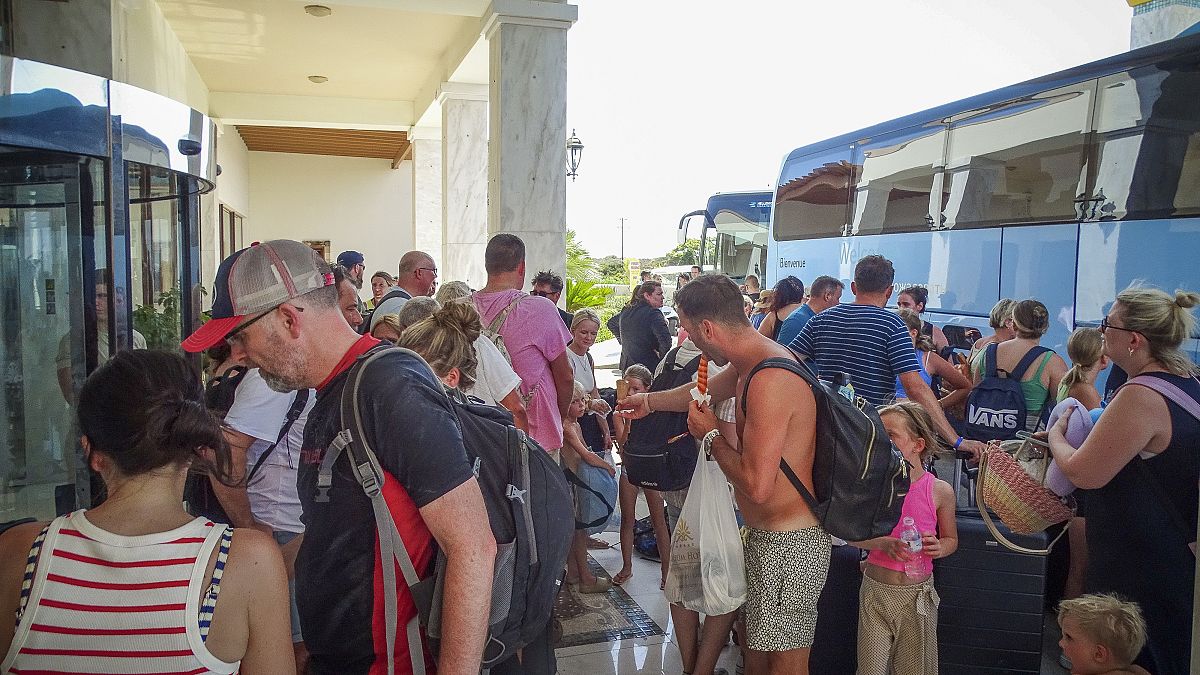
As thousands are evacuated from the Greek islands of Rhodes and Corfu, there are concerns over the future of Greece’s future tourist industry as sweltering heat and future wildfires could hinder the viability of Greek tourism.
As wildfires sweep across Greece the effect on tourism is being felt.
The industry accounts for a large part of the country’s GDP, making up 18.5 per cent of the Greek economy last year.
Fires on the islands of Corfu and Rhodes have already seen mass evacuations of tourists. In Rhodes, 10 per cent of the island's hotel capacity has been effectively shut down due to risks to both locals and holiday goers.
Last weekend saw 19,000 people, mostly tourists, evacuated from the island in the largest evacuation due to fire in Greece ever. On the western island of Corfu, 2,000 people were relocated by land and sea away from fire risk areas.
- Dubrovnik, Cascais, Sicily: Where are the wildfires burning in Europe?
- ‘Every life has value’: Campaigners urge people not to leave animals behind in Greece’s wildfires
How long could wildfires continue in Greece?
Although wildfires are common within Greece during the summer, Europe’s scorching heatwave - causing dry conditions - and high winds have caused many blazes to start all at once.
“Temperature and wind have definitely enabled these fires, and conditions like these are becoming far more likely with climate change,” Dr Mathew Jones, researcher at the Tyndall Centre for Climate Change Research, UK, explains to Euronews Travel.
“Cooler weather will help [quell the fires], so to some extent we are hoping for a shift in the jet stream ."
“Ultimately, the cause of the fire will go down as arson, but it’s changing weather under climate change that is producing more frequent opportunities for events like these.”
The fires on Rhodes and Corfu are just two out of many that the country is battling. Fires are also raging in other parts of the country such as Viotia, a region northwest of Athens, and the island of Evia on the Attic Peninsula, with 64 new fires recorded across the country on Sunday alone.
Temperatures are expected to drop noticeably in most of the country on Thursday, though are expected to pick back up in Rhodes and Corfu in the following days, according to the Hellenic National Meteorological Service (HNMS).
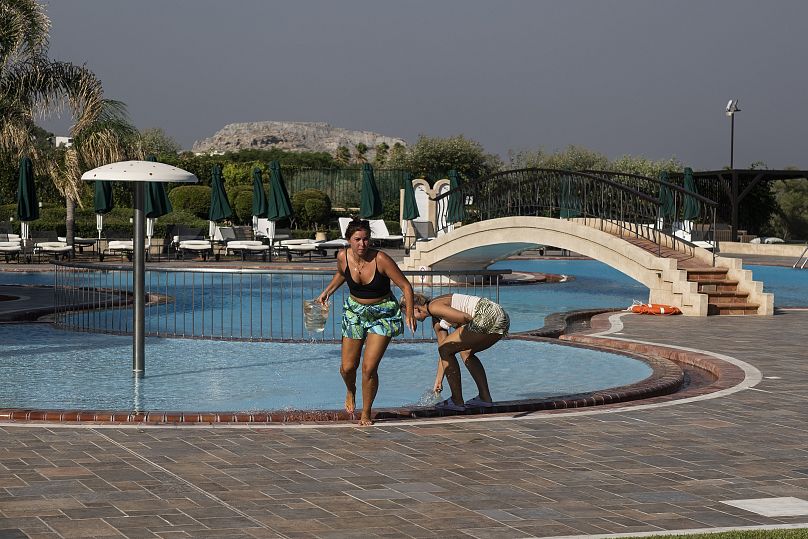
For now, tourists are cautious of flying to seriously fire-affected areas
In Rhodes, hotels in areas unaffected by wildfires are still feeling their impact.
“Today, travellers fear the unknown, but once the fire is totally extinguished, tourism will return to normal,” predicts a spokesperson of Dionysos Hotel in Ialysos, Rhodes.
They predict recovery will be slower for parts of the island ravaged by fires : “That is in the north. In the south, it will take a bit more time.”
Some airlines have cancelled flights or offered alternative bookings to other destinations instead of Rhodes due to the fires.
British airline Jet2 has cancelled all flights to the island until 30 July. Similarly, European travel company Tui has halted all flights to Rhodes until 28 July, and travel to the fire-affected areas won’t be resumed until 30 July.
Tui has also offered those who were set to fly to Rhodes the option to take an alternate holiday with no amendment fees and a full refund if they cancel.
Germans and British make up the majority of tourists on the island.
According to the Greek Travel Pages, 20,000 German holidaymakers have been affected, many returning to Germany or relocated to other accommodation. While the British Foreign Office has deployed a team to support travel operators in bringing tourists home.
The UK Foreign Ministry updated its travel advice regarding Greece on Sunday. It has not advised against travel to fire-affected areas, but urges travellers to check with their travel operators and hotels before departing.
- How damaging were Greek wildfires? Experts explain how heatwave fanned the flames
- Sicily travel warning: Wildfires force evacuation of tourists and transport disruption
Greece remains safe for visitors, says Tourism Minister
Greek PM Kyriakos Mitsotakis described the country’s firefighters as being ‘at war’ during a parliamentary session on Monday.
But Tourism Minister Olga Kefalogianni has emphasised that the majority of the country, including most parts of the affected islands, remains safe for tourists.
“As a Mediterranean country we are facing the effects of climate change and must respond to all the new challenges ahead of us,” Kefalogianni said in a meeting on Tuesday with the Greek National Tourism Organisation and the Hellenic Chamber of Hotels.
Kefalogianni described the islands as “uniquely beautiful and a safe destination”, hoping not to further dissuade tourists from visiting.
Greek airline Sky Express has continued to operate flights to and from Rhodes International Airport Diagoras as scheduled.
- Barcelona, Mallorca, Ibiza: All the beaches in Spain where smoking is banned
Is tourism in the rest of Greece affected by wildfires and heat?
As the temperatures in parts of mainland Greece reach up to 45C some tourists have second-guessed their holiday plans to the country.
One Reddit user offered a three-night, paid for stay in Athens on the Greece Travel subreddit, saying they had changed their plans because of the intense heat.
“It already has impacted tourism widely, and not just in Greece, but across the southern part of Europe. It's just been so incredibly hot,” Doug Lansky, a tourism expert based in Sweden, told National Public Radio.
Although Kefalogianni has reassured visitors that ‘safety comes first’, some travellers are sceptical that even without the fires it still may be too hot.
“There are heavy fires every year, but the temperature is extreme. I don’t feel super comfortable but it’s not at the stage that I would cancel,” one German tourist travelling to an island near Athens told Euronews Travel.
You might also like

Traffic jams and heatwaves disrupt holidaymakers across Europe
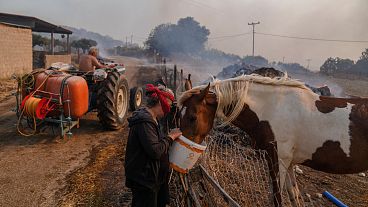
‘Dozens of animals’ burned in shelters as wildfires rip through Greece
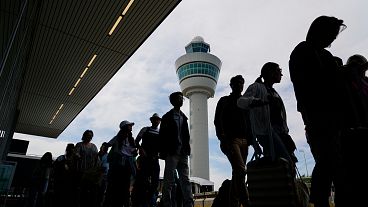
How do airlines think the EES launch will impact passengers?
Winter is here! Check out the winter wonderlands at these 5 amazing winter destinations in Montana
- Travel Tips
Is It Safe To Travel To Greece Right Now? Absolutely.
Published: September 7, 2023
Modified: January 3, 2024
by Dulsea Reed
- Hotel Reviews
- Safety & Insurance
- Travel Destinations
- Travel Guide
Introduction
Greece, with its rich history, stunning landscapes, and vibrant culture, has always been a top destination for travelers. However, with the ongoing COVID-19 pandemic, many people are wondering if it is safe to travel to Greece right now. The answer? Absolutely.
Greece has implemented a range of safety measures to protect its residents and visitors, making it a responsible and secure destination for travel. In this article, we will explore the current situation in Greece, the COVID-19 safety measures in place, the vaccination progress, travel restrictions and requirements, as well as safety precautions for travelers. We will also highlight some of the popular tourist destinations in Greece.
Before we delve into the details, it is important to note that the situation surrounding COVID-19 is constantly evolving. It is crucial to stay informed and follow the guidance of local authorities and health organizations when planning your trip.
Now, let’s take a closer look at the current situation in Greece and the safety measures in place to ensure a worry-free and enjoyable travel experience.
Current Situation in Greece
Greece, like many other countries, has been impacted by the COVID-19 pandemic. However, the country has made significant progress in containing the spread of the virus and has successfully managed the situation. As of now, the situation in Greece is relatively stable.
The Greek government has implemented strict protocols and measures to ensure the safety of its citizens and visitors. These measures include widespread testing, contact tracing, quarantine requirements, and the enforcement of hygiene protocols.
Furthermore, Greece has a robust healthcare system in place to handle any potential cases. Hospitals and medical facilities across the country are well-equipped and ready to provide necessary medical assistance if needed.
The Greek authorities have been working closely with public health organizations to monitor the situation and adapt their strategies as needed. They have shown resilience and determination in their efforts to protect public health and promote responsible tourism.
While the current situation is stable, it is important to remain vigilant and stay informed about any updates or changes. Travelers should regularly check the official websites and advisories provided by the Greek government and relevant health organizations for the latest information.
Next, we will take a closer look at the COVID-19 safety measures that have been implemented in Greece to ensure the well-being of both residents and visitors.
COVID-19 Safety Measures in Place
Greece has implemented rigorous safety measures to prevent the spread of COVID-19 and ensure the well-being of its residents and visitors. These measures have been put in place to create a safe environment for everyone to enjoy their time in Greece.
One of the key safety measures is the mandatory use of face masks. Face masks are required in all indoor public spaces, such as shops, museums, and public transportation. It is also recommended to wear face masks in crowded outdoor settings where social distancing may be challenging.
Social distancing measures are also strictly enforced throughout the country. People are advised to maintain a distance of at least 1.5 meters (5 feet) from others who are not in their immediate group. Public spaces, including beaches, restaurants, and tourist attractions, have implemented measures to ensure appropriate spacing between individuals.
Greece has also implemented a comprehensive testing and contact tracing system. COVID-19 tests are widely available, and many accommodations and tourist venues require proof of a negative test result upon entry. Contact tracing is conducted to identify and notify individuals who may have been in close contact with a confirmed case.
Furthermore, stringent hygiene protocols are in place across Greece. Hand sanitizing stations are widely available, and frequent hand washing is encouraged. Public spaces, accommodations, and restaurants are regularly sanitized and adhere to strict cleaning procedures.
In addition to these measures, Greece has implemented a color-coded system to indicate the risk level of each region. This system allows for targeted measures to be implemented based on the level of risk, ensuring that areas with higher infection rates receive appropriate attention and precautions.
It is important for travelers to familiarize themselves with these safety measures and comply with them during their stay in Greece. By following these protocols, we can all contribute to a safe and responsible travel experience.
Next, let’s explore the vaccination progress in Greece and how it impacts travel.
Vaccination Progress in Greece
Greece has been making steady progress in its COVID-19 vaccination campaign. The government has prioritized the vaccination of its citizens, leading to an increasing number of people receiving the vaccine.
The vaccination campaign in Greece follows the guidelines set by health authorities. Initially, healthcare workers, elderly individuals, and individuals with underlying health conditions were given priority. As the vaccination campaign progressed, eligibility expanded to include more age groups and professions.
Greece has been actively working to secure an adequate supply of vaccines to meet the demand. Vaccines authorized by regulatory bodies such as the European Medicines Agency (EMA) and the World Health Organization (WHO) are being administered in the country.
As of now, a significant portion of the population in Greece has received at least one dose of the COVID-19 vaccine. This is a positive development that contributes to the overall protection against the virus and helps create a safer environment for residents and visitors alike.
The progress in vaccination has had a positive impact on the travel industry in Greece. It has instilled a sense of confidence in travelers, as vaccinated individuals have a lower risk of contracting and spreading the virus.
It is important to note that while vaccination has been effective in reducing the severity of the disease and preventing hospitalization, it does not completely eliminate the risk of infection. Therefore, it is essential to continue practicing safety measures, even if you have been vaccinated.
Next, we will discuss the travel restrictions and requirements for entering Greece.
Travel Restrictions and Requirements
Travelers planning to visit Greece should be aware of the travel restrictions and requirements in place. These measures are designed to protect public health and ensure the safety of both residents and visitors.
Firstly, it is important to check the entry requirements for Greece before you travel. Currently, all travelers must complete a Passenger Locator Form (PLF) at least 24 hours before their arrival in Greece. The PLF includes personal information and details about your trip, such as your accommodation address.
Additionally, depending on your country of origin or transit, you may be required to provide a negative COVID-19 test result upon arrival. The type of test accepted may vary, so it is essential to check the specific requirements for your journey. Some travelers may also be subject to random testing upon arrival.
It is worth noting that fully vaccinated individuals may be exempted from certain testing and quarantine requirements. However, the eligibility and specific conditions may differ based on the country of origin and the type of vaccine received. Again, it is essential to check the latest information and guidelines provided by the Greek authorities.
Travelers should also be aware of any transit requirements if they have layovers or connecting flights in other countries. Some countries may have their own travel restrictions and requirements, which could impact your journey to Greece.
During your stay in Greece, it is important to adhere to the local safety measures, such as wearing face masks, practicing social distancing, and following hygiene protocols. These precautions are in place to protect yourself and others.
It is crucial to stay informed about any updates or changes to the travel restrictions and requirements for Greece. The situation is subject to change, and it is recommended to regularly check the official websites and advisories provided by the Greek government and relevant health organizations.
Now that we are familiar with the travel restrictions and requirements, let’s explore the safety precautions that travelers should take when visiting Greece.
Safety Precautions for Travelers
While Greece has implemented various safety measures to protect travelers, it is also important for individuals to take their own precautions to ensure a safe and enjoyable trip. Here are some key safety precautions for travelers visiting Greece:
- Stay informed: Monitor the latest updates and advisories provided by local authorities and health organizations. Keep yourself updated on any changes to travel restrictions, safety measures, and local regulations.
- Plan ahead: Before you travel, make sure to research and understand the specific requirements and protocols in place for entering Greece, including any testing or documentation needed.
- Practice good hygiene: Wash your hands frequently with soap and water for at least 20 seconds, or use hand sanitizer that contains at least 60% alcohol. Avoid touching your face, especially your eyes, nose, and mouth.
- Wear a mask: Follow the mask-wearing requirements in Greece, which may include wearing masks in indoor public spaces and crowded outdoor settings. It is advisable to bring an adequate supply of masks for the duration of your trip.
- Maintain social distancing: Respect social distancing guidelines by keeping a distance of at least 1.5 meters (5 feet) from others who are not in your immediate group. Avoid crowded places and seek less crowded alternatives if necessary.
- Follow local regulations: Familiarize yourself with and adhere to any local regulations, including capacity limits, curfews, and specific guidelines for tourist attractions, restaurants, and public transportation.
- Choose outdoor activities: Opt for outdoor activities and attractions that allow for better ventilation and natural distancing. Greece offers a wealth of natural landscapes, beautiful beaches, and outdoor recreational opportunities.
- Respect cultural norms: Familiarize yourself with the local customs and practices in Greece, such as greeting etiquette and dining etiquette. Show respect for the local culture and traditions during your interactions.
- Travel insurance: Consider obtaining travel insurance that provides coverage for COVID-19-related expenses. This can provide additional peace of mind and financial protection in case of unforeseen circumstances.
- Monitor your health: Pay attention to any symptoms that may arise during your trip. If you experience symptoms like fever, cough, or difficulty breathing, seek medical assistance immediately and follow the local health protocols.
By following these safety precautions, you can minimize the risk of exposure to COVID-19 and contribute to a safe and responsible travel experience in Greece.
Now, let’s explore some of the popular tourist destinations in Greece that you can consider visiting.
Popular Tourist Destinations in Greece
Greece is renowned for its breathtaking landscapes, ancient history, and stunning islands. Here are some of the popular tourist destinations in Greece that should be on your list:
- Athens: The capital city of Greece, Athens is a mesmerizing blend of ancient history and modern charm. Explore iconic sites like the Acropolis, Parthenon, and the Ancient Agora. Roam the bustling streets of Plaka or visit world-class museums like the Acropolis Museum and the National Archaeological Museum.
- Santorini: Famous for its whitewashed buildings and mesmerizing sunsets, Santorini is a dreamy destination in the Cyclades. Admire the picturesque towns of Oia and Fira, relax on the black sandy beaches, and indulge in delicious Greek cuisine overlooking the Aegean Sea.
- Mykonos: Known for its vibrant nightlife and beautiful beaches, Mykonos is a popular destination for party-goers and sun-seekers. Explore the charming town of Chora, stroll through the narrow streets of the old town, and enjoy the famous nightlife scene in clubs and beachfront bars.
- Crete: The largest Greek island, Crete offers a diverse range of attractions. Discover the ancient ruins of Knossos, hike through the majestic Samaria Gorge, and relax on the stunning beaches of Elafonisi and Balos. Don’t miss the opportunity to savor the unique Cretan cuisine.
- Rhodes: With its medieval architecture and rich history, Rhodes is a captivating destination in the Dodecanese. Explore the UNESCO World Heritage-listed Old Town of Rhodes, visit the ancient acropolis of Lindos, and unwind on the beautiful beaches lining the coast.
- Corfu: Located in the Ionian Sea, Corfu offers a mix of natural beauty and Venetian charm. Stroll through the narrow streets of Corfu Town, visit the historic Achilleion Palace, and relax on the idyllic beaches of Paleokastritsa and Sidari.
These are just a few of the many incredible destinations Greece has to offer. Each region in Greece has its own unique charm and attractions, ranging from historical landmarks to pristine beaches and picturesque villages.
When visiting these destinations, remember to follow the local safety guidelines and respect the natural and cultural surroundings. By doing so, you can fully enjoy your trip while contributing positively to the local communities.
Now that you have an overview of the popular tourist destinations in Greece, you can start planning your unforgettable trip.
Traveling to Greece is not only safe but also an incredible experience that offers a perfect blend of history, culture, and natural beauty. With the implementation of robust safety measures, Greece has made significant progress in managing the COVID-19 pandemic and ensuring the well-being of its residents and visitors.
Throughout the country, you will find strict protocols in place, such as the mandatory use of face masks, social distancing measures, and comprehensive testing and contact tracing systems. These measures, along with the progress in vaccination, contribute to creating a safer environment for travelers.
When planning your trip, make sure to stay informed about the latest travel restrictions and requirements. It is crucial to follow the guidelines provided by the Greek government and health organizations, as they are regularly updated to reflect the evolving situation.
While enjoying your time in Greece, it is important to practice good hygiene, wear masks when required, maintain social distancing, and respect local regulations and customs. By doing so, you can help protect yourself, fellow travelers, and the local community.
Whether you choose to explore the ancient wonders of Athens, relax on the enchanting islands of Santorini or Mykonos, or immerse yourself in the rich history of Crete or Rhodes, Greece has something to offer every traveler.
So, if you are wondering whether it is safe to travel to Greece right now, the answer is a resounding “Absolutely.” With its stunning landscapes, fascinating history, warm hospitality, and robust safety measures, Greece is undoubtedly a must-visit destination for your next adventure.
Start planning your trip to Greece and create memories that will last a lifetime. The wonders of this beautiful country await you!

- Privacy Overview
- Strictly Necessary Cookies
This website uses cookies so that we can provide you with the best user experience possible. Cookie information is stored in your browser and performs functions such as recognising you when you return to our website and helping our team to understand which sections of the website you find most interesting and useful.
Strictly Necessary Cookie should be enabled at all times so that we can save your preferences for cookie settings.
If you disable this cookie, we will not be able to save your preferences. This means that every time you visit this website you will need to enable or disable cookies again.
Cookies on GOV.UK
We use some essential cookies to make this website work.
We’d like to set additional cookies to understand how you use GOV.UK, remember your settings and improve government services.
We also use cookies set by other sites to help us deliver content from their services.
You have accepted additional cookies. You can change your cookie settings at any time.
You have rejected additional cookies. You can change your cookie settings at any time.
Register to vote Register by 18 June to vote in the General Election on 4 July.
- Going and being abroad
- Travel abroad
British visitors hospitalised in Greece
- Foreign, Commonwealth & Development Office
Published 31 May 2024

© Crown copyright 2024
This publication is licensed under the terms of the Open Government Licence v3.0 except where otherwise stated. To view this licence, visit nationalarchives.gov.uk/doc/open-government-licence/version/3 or write to the Information Policy Team, The National Archives, Kew, London TW9 4DU, or email: [email protected] .
Where we have identified any third party copyright information you will need to obtain permission from the copyright holders concerned.
This publication is available at https://www.gov.uk/government/publications/british-visitors-hospitalised-in-greece/british-visitors-hospitalised-in-greece
This guidance aims to help you understand more about the national health system in Greece. It gives you information about the assistance the British consular network can offer you during your hospitalisation.
Your stay at a Greek state hospital
The standard of medical care and common practices in Greek state hospitals is similar to that in the UK. However, some people can find that the language barrier and cultural differences cause additional stress to what is an already traumatic experience. Doctors and nurses are not always fluent in English.
The main difference can be found within the services offered by the nursing team. It is normal for relatives, or friends, to attend to the patient’s daily basic needs. Visiting times are flexible in the public wards. It is also common for a relative or friend to stay with the patient for the entire duration of their stay, including at night-time. Private nurses can be employed for a nursing shift of 8 hours. This can be arranged by speaking to the supervisor at the nurses’ station on the ward. This service will have to be paid for in cash and a receipt should be obtained to submit to your insurance company.
What we can and cannot do for you
When we have been informed of your admittance to hospital, we will contact you as soon as possible. We will provide assistance according to your individual needs and vulnerability.
provide support and advice over the phone
depending on where you are located, visit you in hospital
speak with treating doctors if necessary
contact your family or friends if you would like us to
help you contact your insurance company
continue to offer you support should you be transferred to a state hospital on the mainland
pay your medical bills or other costs
get your better/different treatment than locals receive
translate documents or offer official interpreting services
pay for your medical repatriation or evacuation (medevac)
contact or visit people who have travelled abroad specifically for optional medical treatment
Admission/discharge paperwork
You, or a family member/friend, must complete the hospital paperwork at the admissions’ office. Your passport as well as your European Health Insurance Card ( EHIC )/Global Health Insurance Card ( GHIC ) or Provisional Replacement Certificate ( PRC ) will be required. Admission paperwork will be prepared and should be taken to the nursing station on your hospital ward.
Upon discharge, you will be given discharge paperwork on your ward, and this must be submitted to the admissions’ office.
Scans/further treatment
Sometimes it is necessary for further tests or scans, which are not available at a public hospital, to be conducted. You may be asked to cover these costs and you can claim back from your private insurance.
If the hospital is unable to provide the necessary treatment for your condition, you will be transferred to a larger state hospital on a different island or the mainland of Greece.
Paying the hospital bill
State hospitals in Greece require payment for treatment to be covered by a valid European Health Insurance Card ( EHIC ) or a Global Health Insurance Card ( GHIC ).
If you do not have either with you, you will need to apply for a Provisional Replacement Certificate ( PRC ) which will cover your hospital costs. When you can call the Overseas Healthcare Team in Newcastle on +44 191 218 1999, listen for instructions on how to speak with an operator to request a PRC or apply online .
You will be asked for your National Insurance (NI) number as well as other personal information.
The PRC should be sent to the treating hospital by email.
Public hospitals do not accept payment from private travel insurance. If you don’t have an EHIC , GHIC or PRC you will need to pay for your treatment in cash.
Private hospitals in Greece
If you are hospitalised at a private hospital/clinic in Greece, your EHIC / GHIC will not be accepted. You will need to supply details of your private holiday insurance policy to the hospital administration.
Contact your insurance company
You should contact your insurance/assistance company to advise them of your hospitalisation and to have a case opened for you. Make a note of your case reference as you will need to quote it in any dealings with your insurance/assistance company. Keep receipts for payments you, or your partner, may incur due to your hospitalisation (for example, taxi fares) to submit with your claim. You/or the patient will usually be asked to sign a consent form for release of patient’s GP records. Upon completion, this should be returned to the insurance company, who will then contact the GP to obtain this information. Provided all medical history was declared when the policy was taken out, the insurance company’s medical team will proceed to confirm cover.
Before you leave the hospital
On discharge you will be given a discharge paper which you need to submit to the admissions desk. Make sure you provide the details of your EHIC / GHIC or Provisional Replacement Certificate before you leave the hospital.
Please be aware any medical reports or contents of medical files should be obtained or applied for in person, prior to leaving the hospital, rather than by e-mail upon your return home. Application procedures vary in each hospital.
Fit-to-fly certificate
Your airline may require a fit-to-fly certificate. Public hospitals do not normally provide this certificate to you. You may have to make private arrangements via your insurance company or contact a private healthcare provider.
Repatriation
If you have travel insurance and your claim has been accepted, your insurance company will organise your return to the UK.
However, if you do not have insurance or a valid claim, and you are not well enough to travel on a commercial flight, you will need to contact a private repatriation company . Be aware, they can be very expensive.
Support for British nationals abroad
Healthcare for UK nationals living in Greece
Get healthcare cover abroad with a UK GHIC or UK EHIC
Greece travel advice
Consular staff work in the Foreign, Commonwealth & Development Office in the UK, and in British embassies, high commissions and consulates overseas. Contact details of all British consular offices in Greece:
You can also contact us by phone 24/7 for help or advice from anywhere in the world by calling the Foreign, Commonwealth & Development Office on +44 (0)20 7008 5000. Alternatively, you can send us a written enquiry by using our web form .
This information has been prepared by HMG officials who are not legally or medically trained. It should therefore never be used as a substitute for professional medical or legal advice. It is intended to help British nationals overseas make their own informed decisions. Neither HMG nor any official of the consulate accept liability for any loss or damage which you might suffer as a result of relying on the information supplied.
Is this page useful?
- Yes this page is useful
- No this page is not useful
Help us improve GOV.UK
Don’t include personal or financial information like your National Insurance number or credit card details.
To help us improve GOV.UK, we’d like to know more about your visit today. Please fill in this survey (opens in a new tab) .

IMAGES
COMMENTS
Reissued with obsolete COVID-19 page links removed. Exercise normal precautions in Greece. Read the country information page for additional information on travel to Greece.. If you decide to travel to Greece: Enroll in the Smart Traveler Enrollment Program () to receive security messages and make it easier to locate you in an emergency. Follow the Department of State on Facebook and Twitter.
As in many European cities, there are warnings about crimes targeting tourists. The U.S. Department of State urges caution in Greek cities as crimes like pick-pocketing and purse snatching are known to take place in tourist areas, on public transportation (especially the Metro), and in Thessaloniki shopping areas. Car break-ins have been reported and the U.S. Embassy has received reports of ...
Get out your bucket list; it's time to cross off a major line item: Greece. The fabled land remains tops for culture, food, outdoor travel, art and, of course, beaches and islands.As part of the border-free Schengen Area, it's also incredibly easy to visit for many travelers worldwide. From advance booking to local etiquette - and health and safety issues when you're there - here's ...
follow the guidance of the emergency services. call the Greek Emergency Services on 112 if you are in immediate danger. contact your airline or travel operator who can assist you with return ...
While you're in Greece: ensure that your belongings, including your passport, are secure at all times. don't keep your passport and other types of ID at the same place and carry a photocopy rather than the original. avoid showing signs of affluence. avoid carrying large sums of cash or unnecessary valuables.
The PLF can also be found on the Visit Greece app and at travel.gov.gr. It is strongly recommended that all visitors download the Visit Greece app (GDPR compliant) for free, prior to their arrival in Greece. ... Greek Tourism operates with the maximum safety possible, for tourists, employees and every person involved in the provision of tourist ...
Travelling to Greece. FCDO travel advice for Greece. Includes safety and security, insurance, entry requirements and legal differences.
What travel looks like in Greece in 2020. Thanks to some early intervention, Greece was remarkably successful at containing the coronavirus. The country confirmed its first positive case of COVID-19 on February 6, closed schools, theaters, and gyms in early March and entered full lockdown less than two weeks later.
the maximum safety possible, for tourists, employees and every person involved in the provision of tourist services. Entry into Greece during the period from 21.03.2022 until 04.04.2022, is allowed under the following conditions: From 15 March 2022 onwards, travellers visiting Greece are no longer required to fill out the Passenger
Get the latest travel updates on the re-opening of tourism in Greece following the easing of Covid-19 restrictions. Greece is delighted to be welcoming tourists again, having removed many of the travel restrictions imposed to restrict the spread of Covid-19 and put in place safety protocols to allow you to plan your holiday with greater freedom ...
If your travel plans in Greece include outdoor activities, take these steps to stay safe and healthy during your trip: Stay alert to changing weather conditions and adjust your plans if conditions become unsafe. Prepare for activities by wearing the right clothes and packing protective items, such as bug spray, sunscreen, and a basic first aid kit.
FCDO travel advice for Greece. Includes safety and security, insurance, entry requirements and legal differences.
Safe Travel in Greece During COVID-19. A couple in Thessaloniki - credits: 22Images Studio/Shutterstock. Traveling to Greece has become more straightforward as the country has eased many of its COVID-19-related travel restrictions. Visitors should stay informed about the current situation and the health measures still in place to ensure a safe ...
Spread out any cash and cards over your body and invest in a money belt worn under your clothing. There is also excellent anti-theft travel clothing with secret pockets where you can hide your valuables. Keep your bags locked at the hostel, and expensive items locked in a safe. The nightlife scene is safe in Greece, however, you should always ...
According to statistics provided by EUROSTAT, 18.1% of Greek people report experiencing or witnessing crime, violence, or vandalism. That is a fairly moderate value. In a survey of residents and expats, Numbeo confirmed the moderate crime rate for Greece. Greece scores a 46.33 out of 100 on the site's crime index, a moderate value.
It's got around 6,000 islands, sandy beaches and clear waters, bright as day. Greece really is a dream for tourists, and while it is generally safe, there are parts of it that should be avoided if possible. However, following basic common sense and watching out for any possible dangers should get you through the trip smoothly.
The Tourist Police help with non-serious crimes and can provide police reports and certificates for theft of personal items and lost travel documents. There are tourist police offices across Greece, including on major islands. The main office is at 4 Dragatsaniou Street, Klafthmonos Square, in Central Athens and is open all year.
Drinking Water and Toilets in Greece: What You Need to Know. There's a very important rule for using the bathroom in Greece: don't flush your toilet paper. Find out why. Is Greece safe for travelers? Here's our help, advice and support for planning a successful trip and traveling safely in Greece.
The transportation in Greece is generally convenient and safe for tourists, and the same goes for using the taxi services as well. Risk level: Very low. Pickpockets Risk in Greece. Like any other popular tourist destination, many popular tourist attractions aren't safe from pickpockets in Greece as well.
As wildfires sweep across Greece the effect on tourism is being felt. The industry accounts for a large part of the country's GDP, making up 18.5 per cent of the Greek economy last year. Fires ...
Greece has implemented a range of safety measures to protect its residents and visitors, making it a responsible and secure destination for travel. In this article, we will explore the current situation in Greece, the COVID-19 safety measures in place, the vaccination progress, travel restrictions and requirements, as well as safety precautions ...
Athens has a safety rating of 44.34 which is pretty good for a large city that is home to 3.15 million people. It has a crime rate of 55.66. Locals state that they feel very safe walking around Athens alone, although they are concerned about an increase in crime over the last three years.
Pants, skirts, and shorts. Maxi skirts and linen pants are perfect additions to your Greece packing list. I'm especially eyeing these long, high-waisted skirts from Cuyana and Abercrombie. They ...
Greece is set to introduce an AI app to enhance tourism in the country. Credit: wallyg. CC BY 2.0/flickr Greece is set to introduce a new artificial intelligence (AI) app to enhance the tourist experience in the country, as revealed during The Economist event "In the World of Artificial Intelligence—New Tools, New Possibilities.". During a panel at the event, the initiative—a ...
Contact details of all British consular offices in Greece: Thalita 17, Ag. Dimitrios Sq., 71202, Heraklion, Crete, Greece. You can also contact us by phone 24/7 for help or advice from anywhere in ...
ATHENS, Greece (AP) — One of the world's most intractable cultural disputes is back in the spotlight after a Turkish official cast doubt on the existence of proof long cited by Britain that it ...